ACADEMY ACTIVITIES
Academy News (Covering period from July 1, 2025 to October 10, 2025)
Joint activities with ANRF (erstwhile SERB), DST
I. ANRF (erstwhile SERB), DST-INAE Online and Digital Gaming Research Initiative
The SERB-INAE Online and Digital Gaming Research Initiative, was launched to leverage Digital Gaming Research and Industry in India and to achieve self-reliance in advanced Augmented Reality (AR)/ Virtual Reality (VR) technologies and INAE acts as an implementing agency for this initiative. Being a new area of research and development for the country, a pre-conclave and conclave was conducted following which, the call for proposal was launched in the following three categories:
Category I: R&D in Learning, Educational, and Leisure Online Gaming Platforms
Category II: Immersive Game Prototypes, with a focus on Indian Culture & Values
Category III: Collaborative Technical Design Process- Creation of SERB Game Labs
A total of Rs 25 Cr (recurring and non-recurring) was received initially from SERB for the initiative. In May 2024, the G-Hub project under Category III was withdrawn by ANRF. Currently there are 11 ongoing projects in Category I and II under this initiative and their project progress are monitored by the Program Management and Advisory Committee (PMAC) which was constituted to evaluate, select, and review proposals. PMAC review meetings are conducted biannually wherein Principal Investigators/Co-PI/Industry Partners present their project progress and demonstration of the games developed. So far 3 review meetings have been conducted: two in March and November 2024, and one in April 2025. Based on the recommendations by the PMAC during the review meetings, the second-year funds have been disbursed for the projects. The next review meeting is planned to be held on November 18, 2025.
II. INAE – ANRF (erstwhile SERB) Abdul Kalam Technology Innovation National Fellowship
Launched in 2017, the fellowship recognizes and supports translational research by engineering professionals in public-funded institutions. It focuses on deployable or commercialize technologies rather than past academic achievements. In March 2024, SERB informed that the scheme was temporarily halted due to the transition to ANRF and budget constraints, with no new nominations or extensions permitted under the current framework. Since inception, 57 fellows have been conferred, resulting in 115 patent filings, several technology ventures, and 374 high-impact publications. Despite its discontinuation, the fellowship stands as a landmark initiative that significantly advanced translational research and innovation in India.
Joint Initiatives with DST
I. India-Taiwan Programme of Cooperation in Science & Technology
International Cooperation Division (ICD), DST entrusted INAE to implement India-Taiwan joint program from 2023 onwards which was earlier with Global Innovation & Technology Alliance (GITA). This cooperation is being coordinated by National Science and Technology Council (NSTC) from Taiwan’s side. It is a joint program of cooperation between India and Taiwan and a joint call for proposal is launched every year. 11 projects were approved and are ongoing under CFP 2022. For year 2023, the call for proposals were invited in the broad areas of (i) Artificial Intelligence, IoT (Internet of Things), Big Data, Cyber Security, (ii) Green Energy Technology/ Renewable Energy (solar energy and bioenergy)/ Clean Energy, (iii) Micro/Nano-electronics, Embedded Systems & Sensors, (iv) Biotechnology, Healthcare including Functional Genomics, Drug Development and Biomedical Devices, Agriculture and Food Sciences and (v) Aerospace Technology. For evaluation of the proposals received, a Project Evaluation Committee (PEC) was constituted by DST. Based on the scores received from PEC, a total of 15 proposals have been approved and are currently in progress.
Similarly, for year 2024, call for proposals were invited. “Manufacturing processes” were introduced as new domain and Micro/Nano-electronics, Embedded Systems & Sensors was replaced by “Semiconductors and communications.” A total of 15 projects were recommended by PEC and approved by DST.
The call for the year 2025 was launched from June 2, 2025 to July 31, 2025. The proposals were invited in the following five domains:
- Artificial Intelligence, Cyber Security, Quantum technology
- Biotechnology, Healthcare including Functional Genomics, Drug Development and Biomedical Devices, Agriculture and Food Sciences
- Green Energy Technology/ Renewable Energy (solar energy and bioenergy)/ Clean Energy
- Semiconductor & Communication
- Green Manufacturing Technologies
A total of 185 eligible applications have been received under the current call in five domains. The proposals received shall be evaluated by respective Project Evaluation Committee (PEC), constituted by DST and results shall be jointly declared by INAE and National Science and Technology Council (NSTC). The Joint Committee Meeting (JCM) between DST and NSTC is planned to be held on 17th November 2025.
II. Vaishvik Bharatiya Vaigyanik (VAIBHAV) Fellowship
The VAIBHAV fellowship is instituted by DST and INAE has been entrusted as an implementing agency, to facilitate collaboration between scientists of the Indian Diaspora with HEIs, Universities, and/ or public-funded Scientific Institutions in India. During the first call launched in 2023, a total of 22 VAIBHAV Fellows and 2 Distinguished VAIBHAV Fellows were selected. The projects have since been sanctioned and funds have been disbursed to eligible fellows. The visits to Indian Host Institutes by VAIBHAV fellows are progressing. The post visit reports from the fellows who have completed their visit to Indian host Institutes are being sought and submitted to DST. During the second call launched during 2024, a total of 17 VAIBHAV fellows have been selected by DST. The first-year funds to the fellows have been disbursed to the eligible VAIBHAV fellows.
III. DST-Women International Grant Support (WINGS) program
The WINGS program aims to provide opportunities to Indian Women Scientists, Engineers & Technologists to undertake international-level research experience in advanced research labs of relevant institutions of the world, to enhance their scientific research capacities. The program includes three modules (i) Module I: WINGS Internship (up to 12 months), (ii) Module II: WINGS Fellowship (up to 12 months), and (iii) Module III: Wings Science visit (up to one month). The administrative works of the program are in progress.
Additionally, INAE was entrusted to organize a four-day residential workshop on the Women in Space and Allied Sciences Leadership Programme (WiSLP) from January 21−24, 2025 at the Aryabhatta Hall, Department of Science and Technology (DST), New Delhi, India. This program was organised by DST and the UK-India Education and Research Initiative (UKIERI), India, delivered by the British Council, India and the Coventry University, UK. The initiative focused on supporting institutions and women scientists in fostering and strengthening women’s leadership.
Events conducted by INAE from July 1, 2025 to October 10, 2025
Symposium on National Frontiers of Engineering (NaTFoE) and Innovation in Manufacturing Processes (IMP) 2025
The 19th Symposium on National Frontiers of Engineering (NatFoE-25) and Innovation in Manufacturing Practices (IMP-25), jointly organized by the Indian National Academy of Engineering (INAE) and SRM University–AP, was held on September 15-16, 2025. The event served as a prestigious platform for engineers, scientists, academicians, and industry leaders to exchange knowledge, discuss research advancements, and explore innovative practices in engineering. The symposium also coincided with the celebration of Engineer’s Day, commemorating the invaluable contributions of engineers to societal development. Organized under the aegis of the School of Engineering and Sciences (SEAS), the two-day event featured plenary lectures, invited talks, start-up sessions, poster presentations, and project competitions. More than 250 young engineers and 150 school students from nearby institutions actively participated, fostering an environment. The two Themes of the Symposium were: Theme 1- From Atmanirbhar to Global Leadership: India’s Semiconductor Roadmap and Theme 2- Quantum Leap: Harnessing the Power of Quantum Technology.
Day 1: 15 September 2025 (Monday)
The first day of the symposium commenced with registration at the APJ Abdul Kalam Auditorium, followed by the Invocation and Lighting of the Lamp, marking the formal inauguration of the event. The Welcome Address was delivered by Prof. C. V. Tomy, Dean, School of Engineering and Sciences (SEAS), followed by a briefing on NatFoE-25 and IMP-25 by Prof. Ramesh Vaddi, Convenor. Mr. J. D. Patil, President, INAE, addressed the gathering by the Presidential Address, highlighting the various initiatives undertaken by INAE and the significance of the National Frontiers of Engineering and Innovation in Manufacturing Practices.
Prof. Ch. Satish Kumar, Vice-Chancellor, SRM University–AP, in his address, emphasized the pivotal role of engineering innovation in driving national development. The Abstract Booklet of NatFoE-25 and IMP-25 was formally released, followed by a briefing on Engineer’s Day Celebrations by Dr. Raviteja, Co-Convenor.
The Engineer’s Day Talk was delivered by Dr. Parthasarathi, Group Chairman and Managing Director, SGES, Bangalore, who spoke on the evolution of Indian engineering capabilities. The inaugural session concluded with a Vote of Thanks by Dr. Sunitha K. A., Head, Department of Electronics and Communication Engineering, followed by a Tea Break.
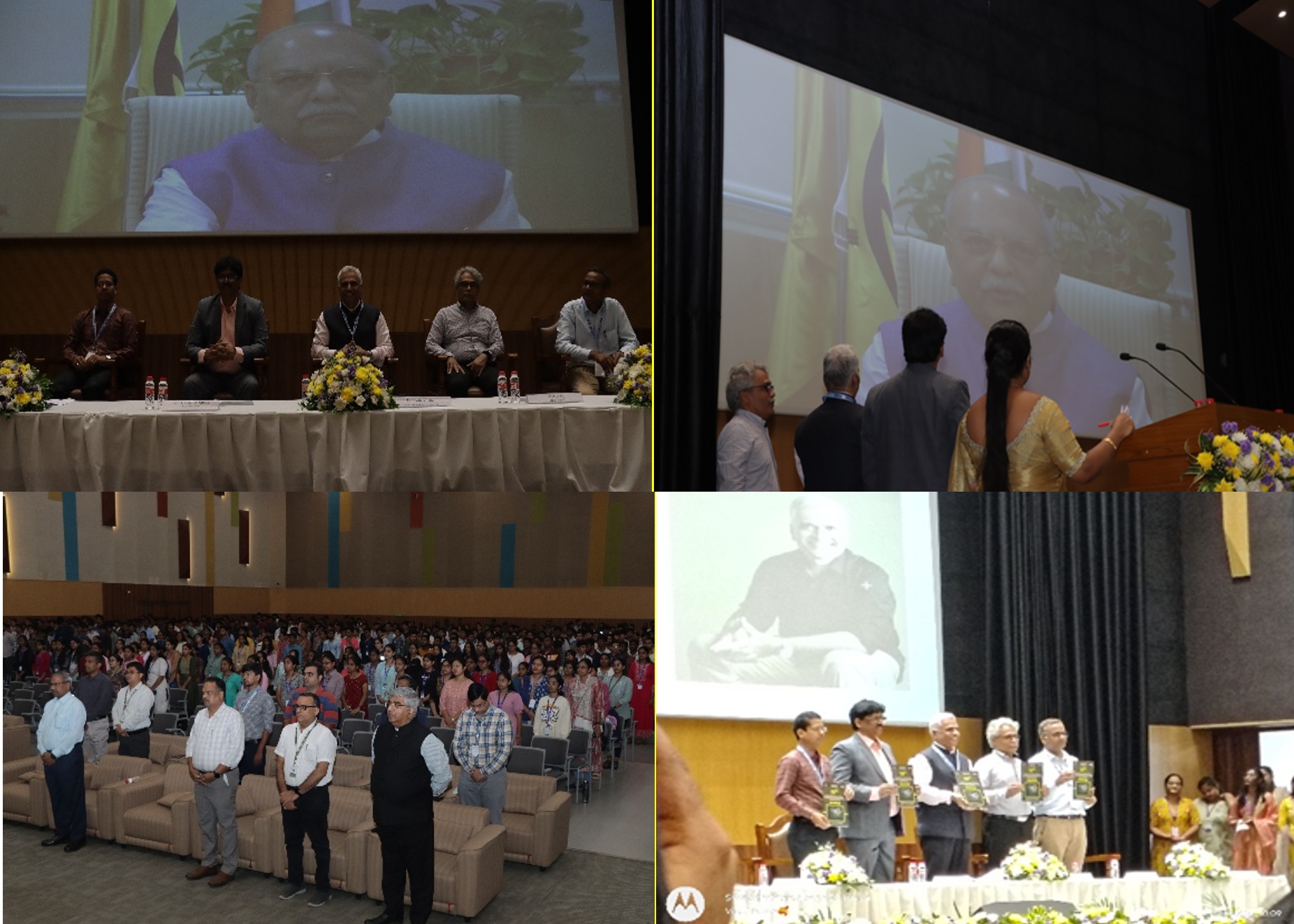 Glimpses of Inaugural Session during Day 1 of the event
Glimpses of Inaugural Session during Day 1 of the event
Session 1: From Atmanirbhar to Global Leadership – India’s Semiconductor Roadmap
Session Chair: Prof. Ramesh Vaddi
The first technical session focused on India’s emerging leadership in the semiconductor ecosystem, exploring the nation’s transition from Atmanirbhar Bharat (self-reliant India) to a position of global technological leadership. The discussions highlighted the rapidly evolving landscape of semiconductor design, manufacturing, and AI hardware, as well as the challenges and opportunities for young Indian engineers in this strategically vital sector.
The session featured the following invited talks:
- Invited Talk: Dr. Satya Gupta, President, VLSI Society of India, delivered an insightful online presentation on “Making India a Semiconductor Product Nation.” Dr. Gupta’s talk was highly motivational, emphasizing the growing opportunities for young engineers under initiatives such as the Chips to Startup (C2S) Program and the upcoming 1TOPS (One Tapeout per Student) initiative.
- Invited Talk: Dr. Navjeet Bagga, Indian Institute of Technology Bhubaneswar, presented a detailed discussion on “Reliability of Emerging Devices,” focusing on the design and performance aspects influencing long-term device stability in semiconductor technologies.
- Invited Talk: Prof. Santosh Kumar Vishwa Karma, Indian Institute of Technology Indore, concluded the session with an online presentation on “AI Hardware Accelerators.” His talk provided a comprehensive overview of the latest developments in AI accelerator architectures and their potential applications in enhancing computational efficiency.
The session offered an integrated perspective on India’s semiconductor roadmap, covering key technological advancements, research priorities, and the strategic vision for fostering innovation-led growth in this domain.
Following the session, participants proceeded for a Lunch Break, which provided an excellent opportunity for networking and informal discussions among delegates, speakers, and participants, facilitating valuable exchanges of ideas and collaborative prospects.
Session 2: Quantum Leap – Harnessing the Power of Quantum Technology
Session Chair: Dr. Sreenivasulu Tupakula
The second session of the day focused on the transformative potential of quantum technologies, exploring advancements in quantum computing, communication, and cybersecurity. The talks highlighted India’s growing efforts toward establishing a robust quantum ecosystem that integrates academic research, industrial innovation, and start-up-led initiatives.
- Plenary Lecture: Ms. Reena Dayal, Founder & CEO, Quantum Ecosystem and Technology Council of India, delivered an online keynote address titled “Harnessing the Power of Quantum Technology.” Her talk provided an overview of the current global quantum landscape, India’s national mission on quantum technologies, and the collaborative opportunities for researchers and industry professionals.
- Startup Talk: Mr. Sanjay Chittore, Founder & CEO, Quantum AI Global, presented “The Quantum Threat: Cybersecurity in the Y2Q Era.” He discussed the potential risks posed by quantum computing to existing cryptographic systems and emphasized the need for quantum-safe cybersecurity strategies in the coming decade.
Following a brief Tea Break, the session resumed with two engaging start-up presentations:
- Startup Talk: Dr. Rohit, Co-founder & CTO, QOSMIC Satellite Systems, delivered an online talk on “Quantum Communication in Space.” His presentation covered the integration of quantum key distribution (QKD) technologies in satellite communication systems and their potential for secure global connectivity.
- Start-up Talk: Prof. N. Usha Rani, Founder, Vayuveda Innovative Tech, concluded the session with a talk titled “Drones at the Frontiers: Python, AI, and IoT for Next-Gen UAV Applications.” She demonstrated how emerging technologies such as AI, quantum sensing, and the Internet of Things are redefining the capabilities of unmanned aerial systems.
The session effectively showcased the synergy between quantum technologies, artificial intelligence, and advanced communication systems, reflecting India’s expanding footprint in next-generation deep-tech innovations and its commitment to driving global leadership in the quantum era.
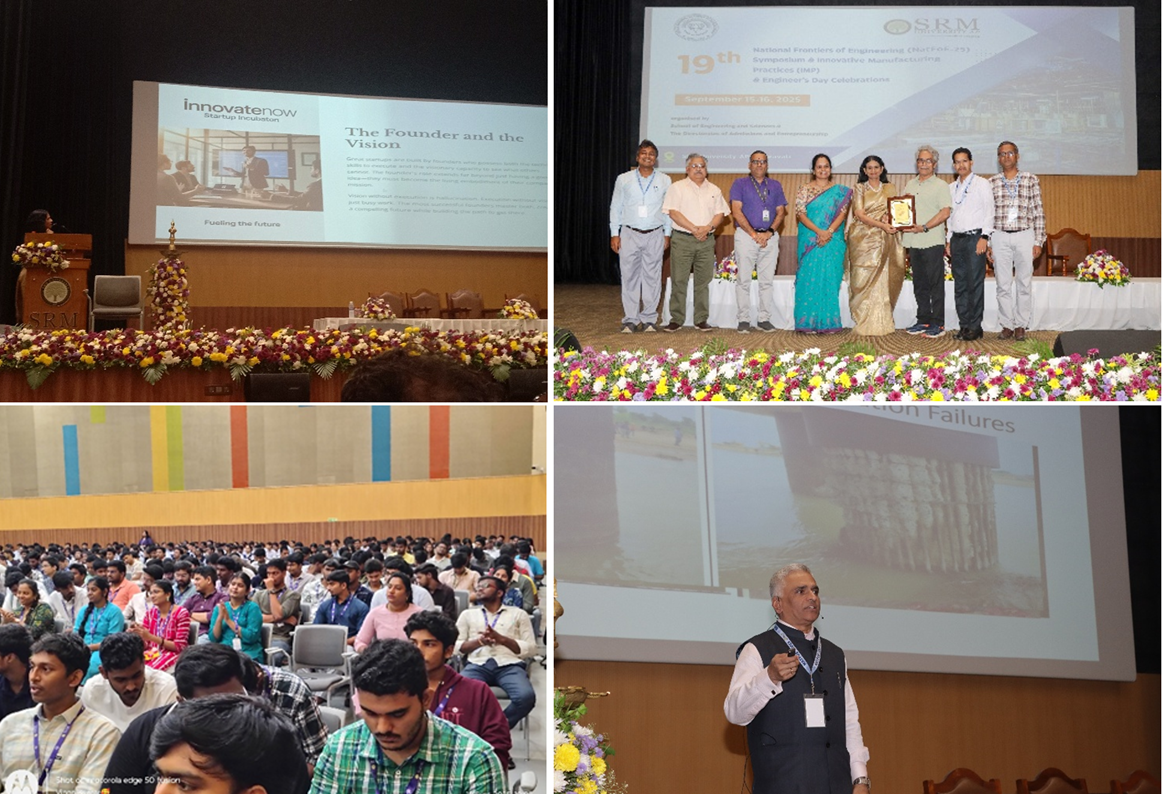 Experts discussed India’s semiconductor roadmap, deep-tech opportunities under Atmanirbhar Bharat during and Quantum Technology Session 1 & Session 2 of Day 1.
Experts discussed India’s semiconductor roadmap, deep-tech opportunities under Atmanirbhar Bharat during and Quantum Technology Session 1 & Session 2 of Day 1.
Day 2: 16 September 2025 (Tuesday)
Session 3: From Atmanirbhar to Global Leadership – India’s Semiconductor Roadmap
Session Chair: Dr. Durga Prakash
The second day of the symposium commenced with an engaging session dedicated to India’s Semiconductor Roadmap, furthering the discussions from Day 1 and emphasizing the nation’s strategic initiatives toward achieving technological self-reliance and global competitiveness in semiconductor research and manufacturing.
- Plenary Lecture: Prof. Siva Rama Krishna Vanjari, Indian Institute of Technology Hyderabad, delivered a plenary lecture on “Fostering the Fab and Fabless Ecosystem – Challenges and Pathways.” His talk highlighted the critical factors influencing India’s semiconductor manufacturing ecosystem and proposed strategies to strengthen the nation’s fabrication (fab) and design (fabless) capabilities.
- Invited Talk: Dr. Preet Yadav, Head, India Innovation Ecosystem, NXP Semiconductors, discussed emerging innovations and design paradigms shaping the semiconductor industry. He emphasized the importance of academia–industry collaboration to accelerate innovation and build a sustainable talent pipeline.
Following a Tea Break, the session continued with insightful presentations and discussions:
- Invited Talk: Dr. Manasa Devi, Inter-University Centre for Astronomy and Astrophysics (IUCAA), Pune, delivered an online presentation on advanced applications of semiconductor technologies, illustrating their role in precision instrumentation and scientific research.
- Startup Talk: Dr. Srinath Reddy, Founder & CEO, AI School, spoke on AI-driven semiconductor advancements, elaborating on the convergence of artificial intelligence and semiconductor design to enhance system efficiency and performance.
A Panel Discussion moderated by Dr. Preet Yadav followed, featuring Dr. Krishna Kanth Avalur and Prof. Siva Rama Krishna Vanjari, on the theme “India’s Semiconductor Roadmap: From Atmanirbhar to Global Leadership.” The panel deliberated on policy initiatives, industry challenges, capacity building, and the roadmap for India’s emergence as a global semiconductor hub.
- Invited Talk: Dr. Krishna Kanth Avalur, Founder & CTO, MOS Art Labs, delivered a concluding address titled “From Silicon to Skill: Building India’s Deep-Tech Talent for the EV Revolution.” He underscored the importance of developing specialized semiconductor and deep-tech expertise to support India’s rapidly growing electric vehicle (EV) ecosystem.
The session concluded with a Lunch Break, providing participants with an opportunity for informal networking and exchange of ideas among industry professionals, researchers, and young engineers.
Session 4: Quantum Leap – Harnessing the Power of Quantum Technology
Session Chair: Dr. Pradyut Sanki
The concluding session of the symposium was devoted to the rapidly evolving field of quantum communication and cryogenic electronics, highlighting recent breakthroughs and entrepreneurial opportunities in the emerging quantum technology ecosystem.
- Plenary Lecture: Prof. R. P. Singh, Physical Research Laboratory (PRL), Ahmedabad, QuTe Labs, delivered a plenary talk on “Quantum 2.0 and Quantum Communication.” He provided a comprehensive overview of the second quantum revolution, emphasizing India’s growing capabilities in secure communication, quantum key distribution, and experimental quantum networks.
- Invited Talk: Prof. Sudeb Dasgupta, Indian Institute of Technology Roorkee, presented an in-depth lecture on “Cryogenic Electronics for Quantum Computing.” His talk explored the design and performance challenges of cryogenic systems that enable scalable quantum processors and low-noise signal processing at ultra-low temperatures.
- Start-up Talk: Dr. Anuradha Thota, Chief Executive Officer, Blackbucks Engineers, delivered a presentation on “Entrepreneurial Pathways in Quantum Engineering.” She discussed the translational potential of quantum research and the role of start-ups in bridging the gap between laboratory innovations and real-world quantum applications.
Following the technical discussions, participants took a short Tea Break, after which parallel sessions commenced.
Poster, Project, and Startup Mentoring Sessions
Running concurrently with the technical sessions, poster presentations and startup mentoring sessions were organized to promote interaction between young researchers, innovators, and industry mentors. The sessions were evaluated by Dr. Srinath Reddy, Dr. Krishna Kanth Avalur, and Dr. Anuradha Thota, who provided valuable insights and feedback to the participants.The National-Level Project Competition (IMP-2025) on “Innovation in Manufacturing Practices” attracted enthusiastic participation across multiple categories. The competition was conducted through three dedicated pitching sessions, as follows:
- Undergraduate Scholars: 10:00 – 11:00 AM
- Postgraduate Scholars: 11:00 – 12:00 PM
- Young Entrepreneurs, Start-ups, and Ph.D. Scholars: 12:00 – 13:00 PM
These sessions fostered a spirit of innovation, interdisciplinary collaboration, and entrepreneurship, providing a dynamic platform for students and start-ups to showcase their creative ideas and technological prototypes aligned with national priorities in advanced manufacturing and engineering innovation.
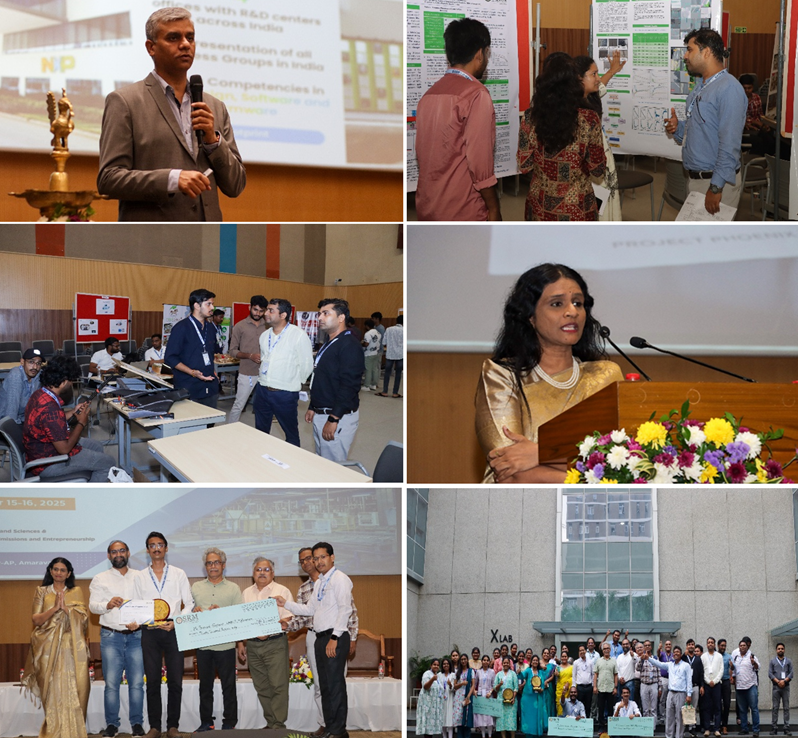 Insightful plenary and start-up talk during Day 2 of the event and Participants exchanging ideas during technical sessions and project competitions
Insightful plenary and start-up talk during Day 2 of the event and Participants exchanging ideas during technical sessions and project competitions
Valedictory Session and Awards
The symposium concluded with the Valedictory Session and Awards Ceremony. The session celebrated the achievements and contributions of participants through the presentation of awards for Best Posters, Innovation in Manufacturing Practices (IMP) Projects, and Startup Pitches. Distinguished guests and organizing committee members acknowledged the enthusiastic participation of young engineers, researchers, and entrepreneurs throughout the two-day event. The valedictory remarks reflected upon the symposium’s success in fostering collaboration between academia, industry, and startups, and in advancing dialogue on the nation’s technological frontiers. The event underscored SRM University–AP’s commitment to nurturing future engineers, promoting innovation-driven research, and strengthening India’s leadership in the semiconductor and quantum technology sectors.
Conclusion
The 19th National Frontiers of Engineering (NatFoE-25) and Innovation in Manufacturing Practices (IMP-25) served as a dynamic and prestigious platform for the exchange of ideas and the dissemination of cutting-edge research. By bringing together experts from academia, industry, research organizations, and startups, the symposium facilitated insightful deliberations on the dual themes—India’s Semiconductor Roadmap and Quantum Leap Technologies. The discussions emphasized the importance of innovation, entrepreneurship, and interdisciplinary collaboration in realizing the vision of Atmanirbhar Bharat. The two-day event not only commemorated Engineer’s Day but also celebrated India’s transformative journey toward global leadership in deep-tech, quantum technologies, and advanced manufacturing.
INAE Youth Conclave 2025
Anurag University, Hyderabad hosted the INAE Youth Conclave 2025 on 20th September 2025, a prestigious event organized under the aegis of the Indian National Academy of Engineering (INAE). The conclave served as a vibrant platform to inspire young engineers and innovators to harness the power of Artificial Intelligence (AI) for addressing societal challenges and contributing to nation-building. The theme of the Conclave was “AI in Social Engineering for a Better Tomorrow”.
The event was inaugurated by eminent dignitaries, including Mr. J. D. Patil, President, INAE, and Mr. Kartik Upendra Matmari, Senior Director, Accenture Technology, Hyderabad. Their presence, guidance, and encouragement underscored the significance of the conclave in shaping the next generation of engineering leaders. The inaugural ceremony was also graced by Prof. U. B. Desai, Chancellor, Anurag University and Vice-President, INAE; Prof. Archana Mantri, Vice Chancellor, Anurag University; Mr. Anurag Palla, Associate Vice President (Strategy); Dr. V. Vijaya Kumar, Dean, School of Engineering; and Dr. G. Vishnu Murthy, Dean, Computer Science and Engineering. Their visionary leadership, mentorship, and support played a pivotal role in bringing the conclave to fruition and ensuring its grand success.
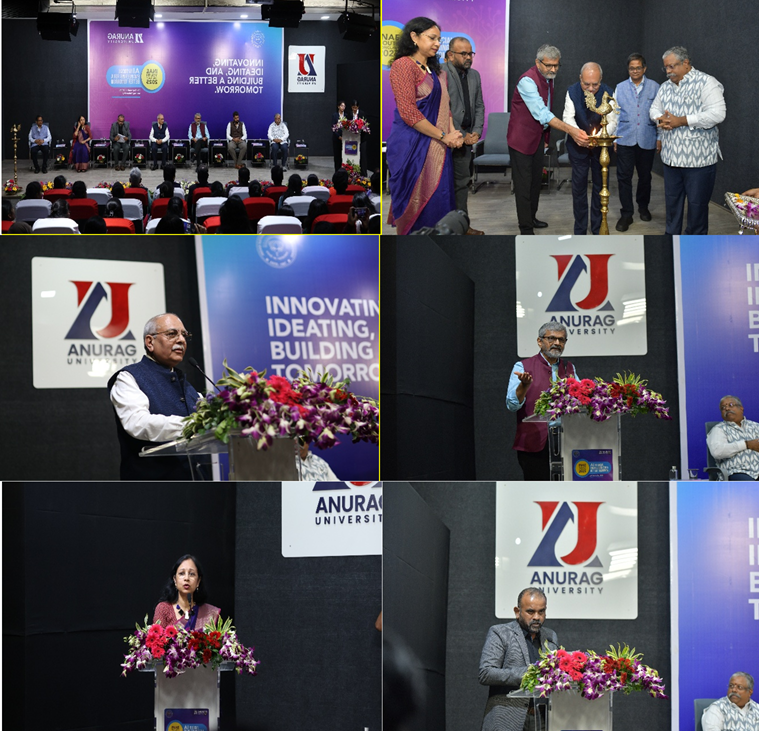 Distinguished dignitaries gracing the inaugural ceremony of the INAE Youth Conclave 2025
Distinguished dignitaries gracing the inaugural ceremony of the INAE Youth Conclave 2025
The central theme of the conclave, “AI in Social Engineering for a Better Tomorrow,” focused on exploring the transformative potential of Artificial Intelligence in fostering inclusive, sustainable, and technology-driven societal progress. The sub-themes provided participants with a multidisciplinary perspective and included the following focus areas:
- Education, Skilling & Employment
- Climate Resilience & Green Engineering
- Smart Cities & Inclusive Governance
- Sustainability & Smart Agriculture
- Healthcare & Well-being
- Space Technology and Space Exploration
The conclave brought together young innovators, researchers, technologists, and students from across the country to engage in a series of competitive and knowledge-driven activities designed to promote creativity, critical thinking, and collaboration.
The four major competitions conducted as part of the conclave were:
- Project Expo:
A platform for showcasing innovative prototypes, working models, and real-world engineering solutions developed by students and young researchers. - Ideation Challenge:
A brainstorming event encouraging participants to propose feasible, impactful, and technology-enabled solutions to pressing real-world problems aligned with the conclave themes. - Tech Art – Data Storytelling:
A unique competition combining creativity and analytics, where participants presented meaningful data insights through visual storytelling, blending art and technology to convey powerful narratives. - Poster Presentation:
An academic exhibition that enabled participants to communicate their research findings, design concepts, and technological advancements through posters.
 Project Expo exhibition and evaluation by industry experts
Project Expo exhibition and evaluation by industry experts
 Ideation event evaluated by four industry experts
Ideation event evaluated by four industry experts
 TeachArt & Data Story Telling Competition presentations and evaluation
TeachArt & Data Story Telling Competition presentations and evaluation
 Poster Presentation competition and evaluation
Poster Presentation competition and evaluation
The Valedictory Ceremony of the INAE Youth Conclave 2025 was graced by Dr. Shreekant Sharma, Director, National Institute for Micro, Small and Medium Enterprises (MSME), as the Chief Guest. In his valedictory address, Dr. Sharma emphasized the critical role of innovation and entrepreneurship in shaping India’s future and highlighted the importance of youth-led technological initiatives in solving contemporary societal challenges. He urged students to leverage their technical expertise to build sustainable and inclusive solutions, aligning with the national vision of “Atmanirbhar Bharat.”
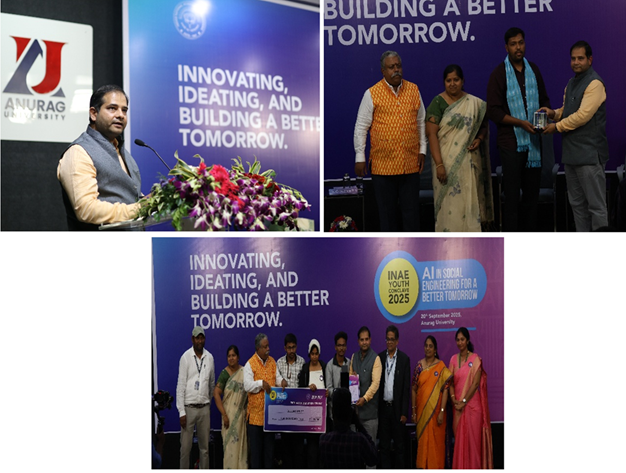 The Chief Guest for the valedictory ceremony graced the occasion, which also included the felicitation of jury members and the prize distribution to winning teams.
The Chief Guest for the valedictory ceremony graced the occasion, which also included the felicitation of jury members and the prize distribution to winning teams.
The ceremony concluded with the announcement of competition results and felicitation of winners, followed by a vote of thanks to all dignitaries, participants, and organizing members for their enthusiastic participation and contributions.
The INAE Youth Conclave 2025 at Anurag University emerged as an inspiring and insightful event, fostering collaboration between academia, industry, and young innovators. It successfully provided a platform for students to exchange ideas, explore new technological frontiers, and reaffirm their commitment to using engineering and AI for societal betterment. The conclave truly embodied the spirit of innovation, inclusion, and leadership empowering youth to engineer a smarter, greener, and more sustainable future for the nation. The details of the events, including the names of the jury members and the list of winners, are provided at Appendix I…
Celebration of 2nd National Space Day -2025 on 23rd August 2025
The Institution Innovation Council, in collaboration with Department of Space Engineering and Rocketry, BIT Mesra, Ranchi, and Indian National Academy of Engineering celebrated 2nd National Space Day on 23rd August 2025 at R&D Building Seminar Hall-II with great enthusiasm and participation from students and faculty members. The event witnessed an overwhelming response, with students from renowned schools including DAV Gandhi Nagar, DAV Hehal, Ranchi, Delhi Public School Bokaro, and Jawhar Navodaya Vidyalaya, Mesra taking part in these competitions. The Chief Guest of the National Space Day ’25 celebrations was Shri T. Sivamurugan, Scientist-G, Project Director, Test Vehicle Program, VSSC, ISRO. The objective of the 2nd National Space Day 2025 celebration was to honour India’s historic achievements in space exploration, particularly the successful soft landing of Chandrayaan-3 on the Moon’s south pole, while inspiring the next generation to dream big in the fields of science, technology, engineering, and mathematics (STEM).
Inauguration Ceremony with BIT Institute Prayer
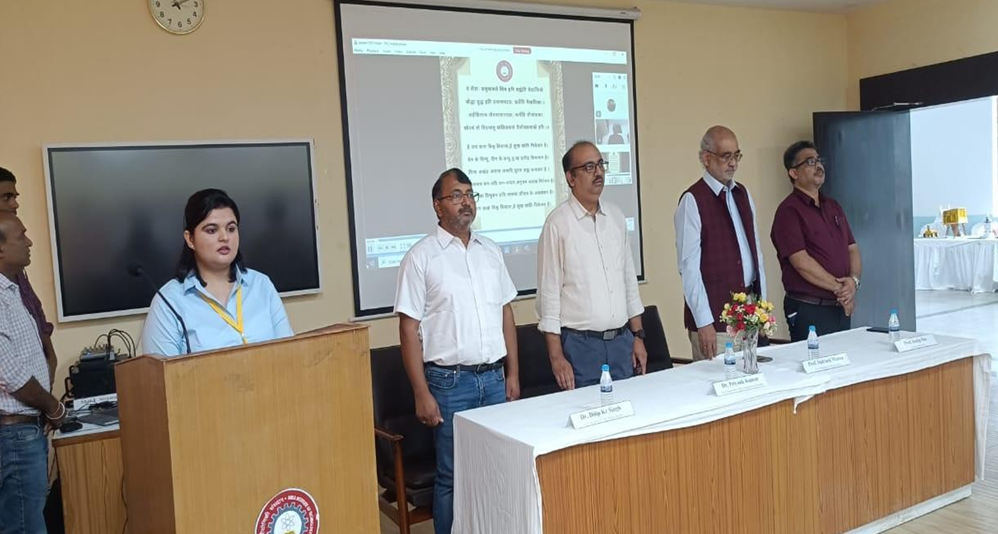 Delegates from Right to left – Prof. Sudip Das, Registrar BIT Mesra, Prof. Indranil Manna, Vice Chancellor, BIT Mesra, Dr. Priyank Kumar, Head, Department of Space Engineering and Rocketry and Dr. Dilip Kr Singh, Co-Convenor, IIC- BIT Mesra
Delegates from Right to left – Prof. Sudip Das, Registrar BIT Mesra, Prof. Indranil Manna, Vice Chancellor, BIT Mesra, Dr. Priyank Kumar, Head, Department of Space Engineering and Rocketry and Dr. Dilip Kr Singh, Co-Convenor, IIC- BIT Mesra
The guests were welcomed at 11:00 AM. and the event started with the institute prayer with the welcome address by Dr. Priyank Kumar, HoD, Space Engineering and Rocketry Department. Dr. Priyank Kumar, HoD, Space Engineering and Rocketry welcomed the Chief Guest, Shri T. Sivamurugan, Scientist-G, Project Director, Test Vehicle Program, VSSC, ISRO and all the participants. He emphasized on the requirement of Space Tech to achieve the targeted milestones so that our nation becomes self-reliant and becomes a Viksit Bharat by 2047.
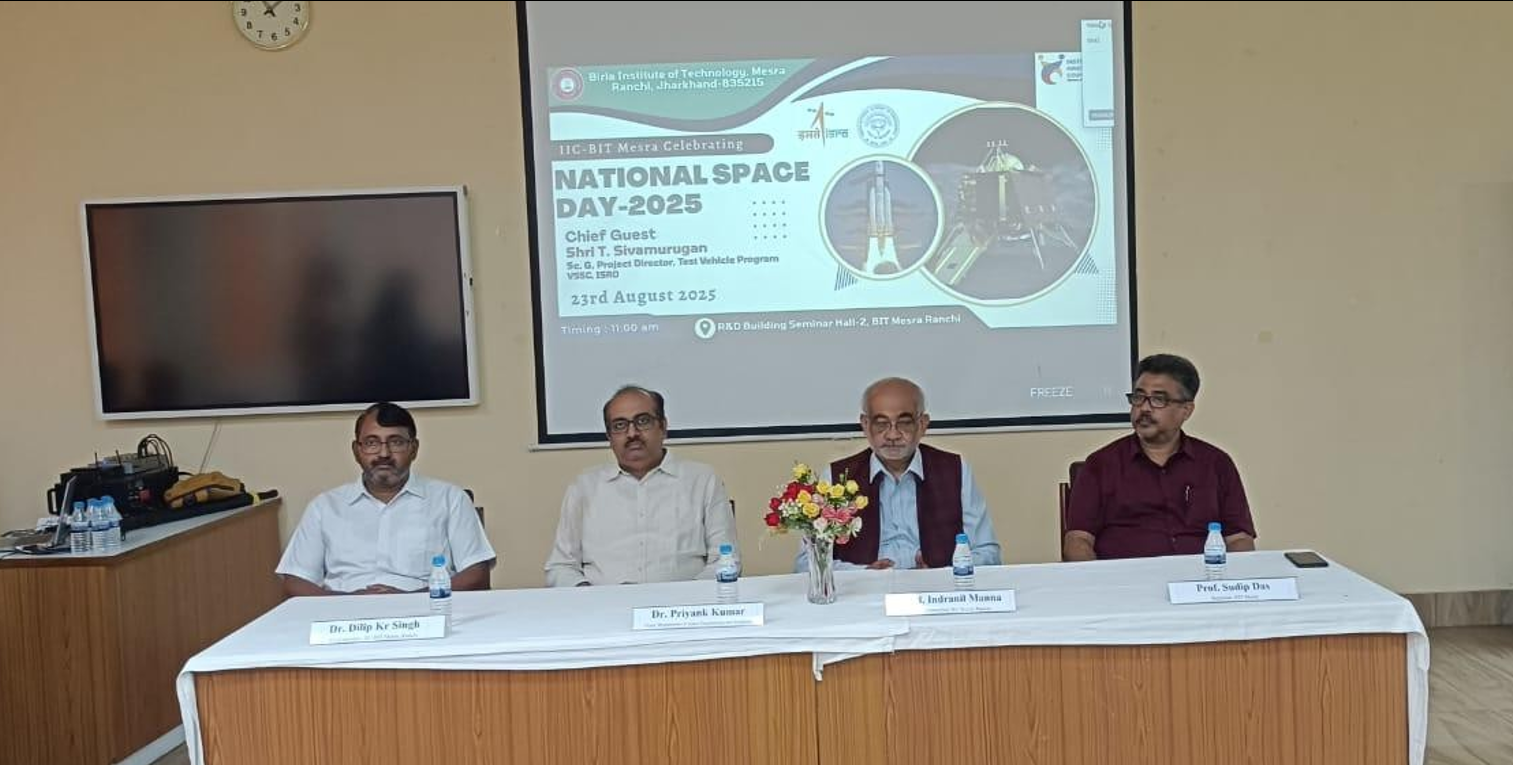
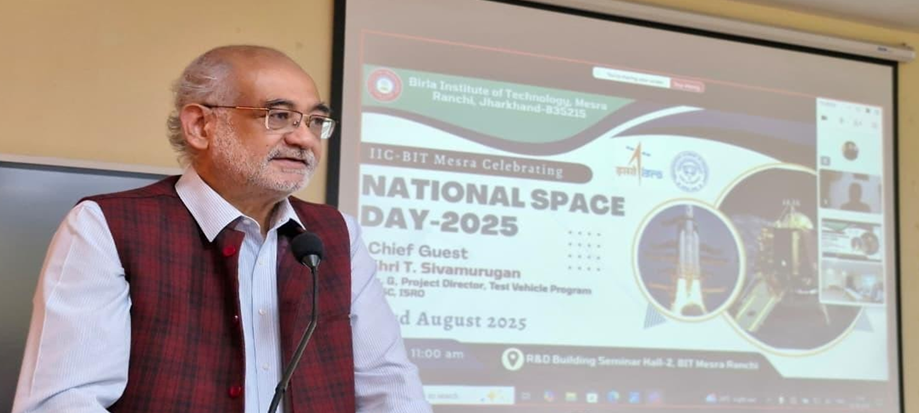 Prof. Indranil Manna, Vice Chancellor, BIT Mesra Addressing the Participants and Faculty Members
Prof. Indranil Manna, Vice Chancellor, BIT Mesra Addressing the Participants and Faculty Members
Professor Indranil Manna, Vice-Chancellor, BIT Mesra addressed the audience with his informative words and appreciated all the participant for joining the celebration of National Space Day’25. Prof. Manna said that India has scripted history with the successful landing of Chandrayaan-3 on the Moon, marking a proud moment for the nation and a defining milestone in global space exploration. The mission was designed with robust systems, meticulous planning, and improved landing strategies to overcome past challenges.
The Chief Guest, Shri T. Sivamurugan, Scientist-G, Project Director, Test Vehicle Program, VSSC, ISRO, was invited online and he shared his valuable insights on India’s remarkable journey in space exploration and motivated young minds to contribute to the nation’s space. endeavors. Shri T. Sivamurugan highlighted ISRO’s technological advancements, rockets, ongoing projects, and the growing role of private participation in space exploration.
The “National Space Day” celebration at BIT Mesra organized jointly in collaboration with Department of Space Engineering and Rocketry, BIT Mesra, Ranchi, and Indian National Academy of Engineering turned out to be an inspiring event that kindled scientific temperament, innovation, and creativity among school children and university students alike. With insightful talks, engaging competitions, and the presence of eminent personalities from academia and ISRO, the program was a resounding success.
Further details of the event can be viewed by clicking here….
Signing of MoU between ISRO and INAE on September 23, 2025 at New Delhi
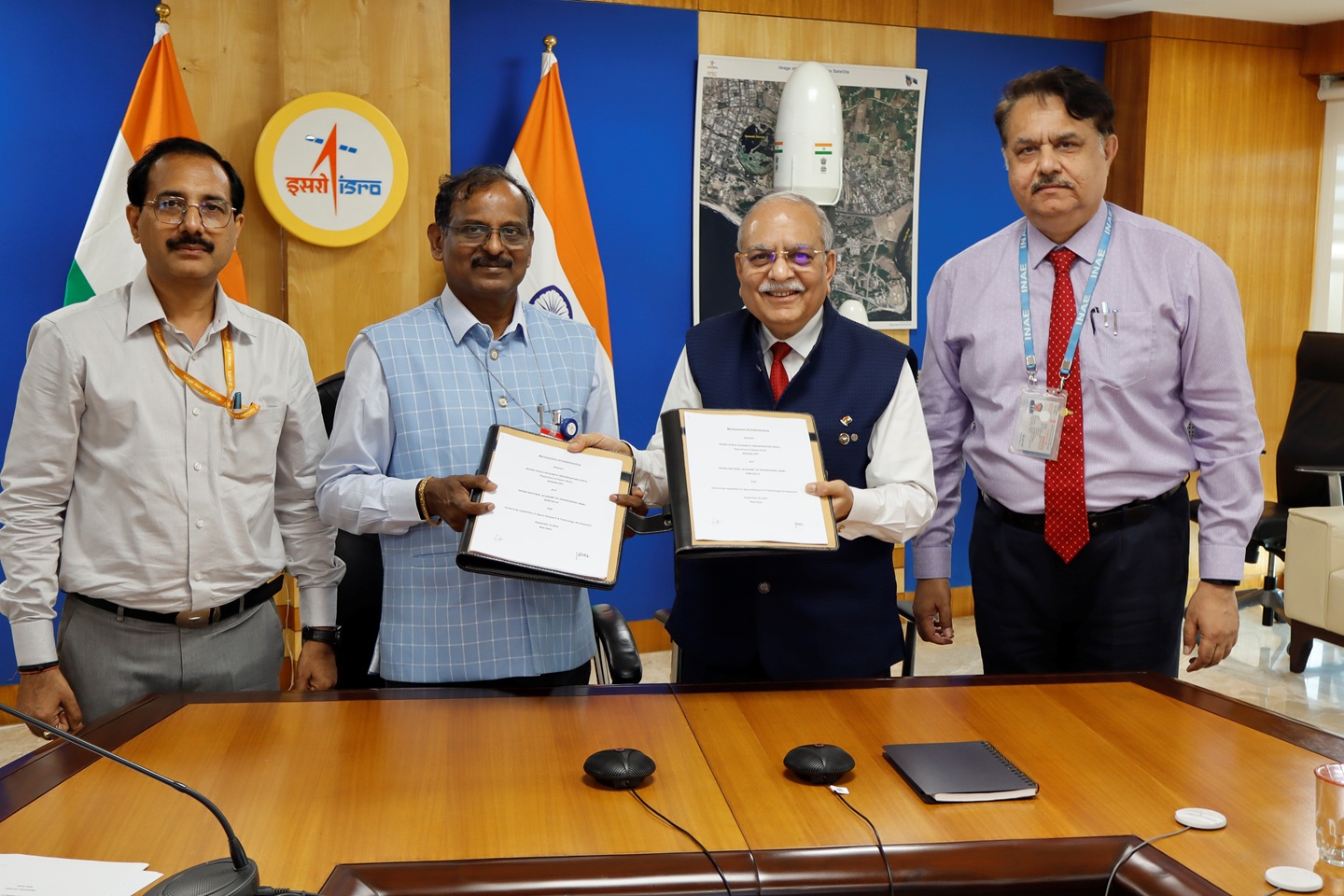 Signing of MoU between ISRO and INAE on September 23, 2025 at New Delhi by Dr V Narayanan, FNAE, Chairman, ISRO (second from left) and Mr. J.D. Patil, President, INAE (second from right)
Signing of MoU between ISRO and INAE on September 23, 2025 at New Delhi by Dr V Narayanan, FNAE, Chairman, ISRO (second from left) and Mr. J.D. Patil, President, INAE (second from right)
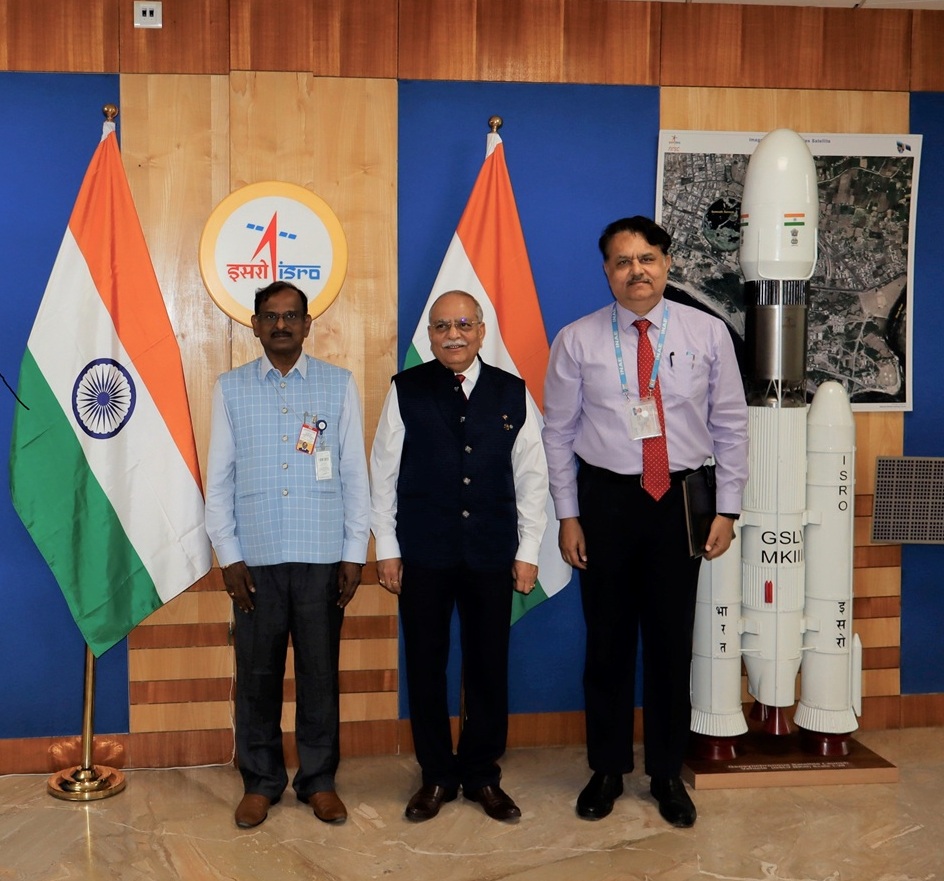
An MoU was signed between Indian Space Research Organization (ISRO) and Indian National Academy of engineering (INAE)m on September 23, 2025 at New Delhi for institutionalizing joint activities between ISRO and INAE and for utilizing the expertise of INAE Fellows and also facilitating of nominations from ISRO scientists for INAE Fellowship and Membership accordingly. The MoU was signed by Dr V Narayanan, FNAE, Chairman, ISRO and Mr. J. D. Patil, President, INAE and heralds the beginning of important joint activities and initiatives between the two prestigious organizations.
The Centre of Engineering Education Excellence (CEEE) Program
Summary : The Centre of Engineering Education Excellence (CEEE) Program, launched through CSR funding from the Infosys Foundation in partnership with the Indian National Academy of Engineering (INAE), is a transformative initiative aimed at elevating the quality of engineering education in India. Recognizing the pressing need to bridge the skills gap among engineering graduates, particularly from Tier 3 and 4 institutions, the ₹38.35 crore, four-year program (2024–2028) focuses on upskilling faculty members who teach core engineering subjects during formative undergraduate semesters. By leveraging the mentorship of INAE Fellows, domain experts, and senior faculty from premier institutions, the program delivers a blended model of physical and virtual training across five key engineering domains. With a goal to mentor nearly 3,750 faculty members through 125 mentors by its conclusion, CEEE seeks to indirectly impact thousands of engineering students, enhancing their employability and innovation capacity. A robust governance structure ensures accountability and quality, while competitive financial support enables widespread participation. This initiative exemplifies a powerful collaboration between industry and academia, advancing national goals such as Skill India and contributing meaningfully to the vision of a Viksit Bharat by 2047
The formal press release was released on 19th December 2024 and link for the same is:
An MoU was signed with Infosys Foundation, AICTE and IITs Kharagpur, Madras, Bombay, Kanpur and Delhi.
The program focuses on faculty engaged in teaching core, fundamental courses during the second, third, and fourth semesters — a critical stage where students acquire essential engineering concepts. The five domains covered under the initiative include:
- Computer Science and Information Technology (including Data Science and AI/ML)
- Electrical, Electronics, and Instrumentation Engineering
- Mechanical, Aerospace, and Energy Engineering
- Materials, Chemical, and Biomedical Engineering
- Civil and Environmental Engineering
For each domain, five strategically selected core subjects have been identified. The faculty selected for this program (mentees) will undergo a combination of intensive physical mentorship and virtual training annually. The physical mentorship for two-week program was conducted during the summer months (from 26th May-18th July 2025) This is being followed by a two to three-week virtual mentorship program till 31st December 2025.
Local Chapter Activities and Webinar Series held during July 2025 to October 10, 2025
The following Webinars/activities/meetings/Technical Lectures were conducted during July 2025 to October 10, 2025 by INAE Local Chapters.
INAE Bhubaneswar Chapter
(i) The 61st lecture of the INAE Distinguished Lecture Series was organized by INAE Bhubaneswar Chapter, jointly with SOA University, CSIR-IMMT Bhubaneswar, IIT Bhubaneswar, NISER Bhubaneswar and IEEE Bhubaneswar Sub-section and delivered by Prof. Pratim K. Chattaraj on 24th July 2025 on “All- Metal Aromaticity and Hydrogen Storage: A Conceptual DFT Approach”.
Key Points: Several metal clusters exhibit aromatic behaviour. Conceptual density functional theory has been found to be useful in analyzing the behaviour of all- metal aromatic compounds like and all-metal antiaromatic compounds like and their complexes in terms of different global and local reactivity descriptors as well as the nucleus independent chemical shift. Aromaticity and antiaromaticity in cyclic alkali clusters like and, polyacene analogues of inorganic ring compounds, multivalent superatoms, trigonal cyclic – bonded dianions like and as well as their different sandwich and multi- decker complexes are analyzed in terms of those reactivity descriptors and the associated electronic structure principles. The hydrogen storage ability of these clusters was explored.
Bio-data: Dr. Pratim Kumar Chattaraj is a Distinguished Visiting Professor at the Birla Institute of Technology Mesra. Formerly he was an Institute Chair Professor at Indian Institute of Technology (IIT) Kharagpur. He received his PhD from IIT Bombay. He was a research associate in the University of North Carolina, Chapel Hill, USA, and FAU, Erlangen-Nürnberg, Germany. He has been actively engaged in research in the areas of density functional theory, ab-initio calculations, nonlinear dynamics, aromaticity in metal clusters, hydrogen storage, noble gas compounds, machine learning, confinement, fluxionality, chemical reactivity and quantum trajectories. He was honored with: University Gold and Bardhaman Sammilani medals; INSA (Young Scientist) medal; CRSI Bronze and Silver medals; IAAM medal; Associate, Indian Academy of Sciences; BM Birla Science Prize; BC Deb Memorial award; Institute Chair Professorship Award (IIT Kharagpur); Acharya P.C. Ray Memorial Award (Indian Chemical Society); Professor Sadhan Basu Memorial Lecture Award of INSA; Professor R.P. Mitra Memorial Lecture Award, Delhi Univ.; Professor S.K. Siddhanta Memorial Lecture Award, Burdwan Univ.; Professor Prafulla Chandra Ray Memorial Lecture award (NASI). He is a Fellow of the World Academy of Sciences (TWAS), Italy, Royal Society of Chemistry, UK, Indian Natl. Science Academy; Indian Academy of Sciences; National Academy of Sciences, India; West Bengal Academy of Science and Technology; and FWO, Belgium. He is a Sir J.C. Bose National Fellow. He has published more than 500 research papers and book chapters. He has received more than 27700 citations with h- index = 78, Google Scholar Citations. He was Convener, Center for Theoretical Studies, Convener, Kharagpur Local Chapter, INSA, Council member of CRSI, Member, Joint Science Education Panel of Science Academies of India, Dean (Faculty) and Head of the Chemistry Department of IIT Kharagpur. He was a Distinguished Visiting Professor of IIT Bombay. He was/is in the Editorial Board of a number of journals published by the American Chemical Society, Elsevier, Springer, SAGE, Frontiers Group, INSA, etc. Several of his papers have become hot/most accessed/most cited/cover/Editors’ choice articles.
You Tube Video Recording Link : https://youtu.be/EaGEEZccFC0
People Participated: 50
(ii) The 62nd lecture of the INAE Distinguished Lecture Series was organized by INAE Bhubaneswar Chapter, jointly with SOA University, CSIR-IMMT Bhubaneswar, IIT Bhubaneswar, NISER Bhubaneswar and IEEE Bhubaneswar Sub-section and delivered by Dr. Arpan Pal on 30th July 2025 on “Device Edge Computing and AIoT for Intelligent Sensing”.
Key Points: The rise of Internet of Things (IoT) and sensor-driven analytics have brought about a significant change in the way that various machines, physical devices, robots and objects interact for performing Edge analytics (also known as AIoT). There is a growing focus on the Device Edge, the constrained compute-memory-power devices that are at the endpoints of the network. Such tiny devices are prime enablers of edge analytics, performing first level of data reduction, multi-sensor fusion, prediction, and inferencing.
In this talk the speaker introduced the device edge computing and its motivation followed by its applications in machine, material, infrastructure, people and earth sensing in the areas of manufacturing, retail, healthcare and sustainability. Then a deep dive was done on three important technologies driving this – sensing, computing and communication and cover many upcoming areas like nano sensing, quantum sensing, neuromorphic computing and reconfigurable intelligent surfaces.
Biodata: Arpan Pal has more than 33 years of experience in Intelligent Sensing, Signal Processing & AI, Edge Computing and Affective Computing. Currently, as Distinguished Chief Scientist and Research Area Head, Embedded Devices and Intelligent Systems, TCS Research, he is working in the areas of Connected Health, Smart Manufacturing, Smart Retail and Remote Sensing.
He has filed 200+ patents (out of which 100+ granted in different geographies) and has published 180+ papers and book chapters in reputed conferences and journals. He is listed among the top 15 innovators in India in terms of patents. He is two times winner of Tata Group top Innovation award in Tata Innovista under Piloted technology category.
He has also written three complete books on IoT, Digital twins in Manufacturing and Application of AI in Cardiac Disease screening. He is on the governing/review/advisory board of some of the Government organizations like MeitY, IIIT and Technology Innovation Hubs. He is on the editorial board of notable journals like ACM Transactions on Embedded Systems and is on the committee of notable conferences like IEEE Sensors, IEEE ICASSP and IEEE Percom. Prior to joining Tata Consultancy Services (TCS), Arpan had worked for DRDO, India as Scientist for Missile Seeker Systems and in Rebeca Technologies as their Head of Real-time Systems. He is a B.Tech and M. Tech from IIT, Kharagpur, India and PhD. from Aalborg University, Denmark.
People Participated: 56
(iii) The 63rd lecture of the INAE Distinguished Lecture Series was organized by INAE Bhubaneswar Chapter, jointly with SOA University, CSIR-IMMT Bhubaneswar, IIT Bhubaneswar, NISER Bhubaneswar and IEEE Bhubaneswar Sub-section and delivered by Professor Souvik Bhattacharyya on 11th August 2025 on “Institution Building & Transformation: From Legacy to Leadership”.
Key Points: In an era of unprecedented higher education disruption, most institutions struggle between preserving tradition and embracing disrupting transformation. This session unveils the strategic blueprint behind achieving high institutional growth through leadership.
Drawing from direct leadership experience and global advisory roles, it deconstructs institutional excellence through six critical verticals: Faculty & Research Excellence, Student Success, Academic Innovation, Internationalization, and Alumni Engagement. Unlike theoretical frameworks, this framework emerges from real-world execution across multiple campuses and institutions—transforming legacy eco-systems while building research culture and navigating diverse regulatory environments. The session shared comprehensive change management strategies tested across multiple contexts. Central to this philosophy is recognizing that institutional excellence emerges not from managing academic units but orchestrating ecosystems—where top faculty attracts exceptional students, generates cutting-edge research, builds strategic partnerships, and creates alumni networks that become powerful growth multipliers. Beyond impressive metrics, it addressed the deeper leadership challenge: architecting sustainable excellence that outlasts individual leaders. It demonstrates how these university functions create compound effects, turning constraints into competitive advantages and regulatory requirements into innovation catalysts, offering both strategic vision and tactical frameworks for creating tomorrow’s institutions while honouring legacy foundations.
Bio data: Professor Souvik Bhattacharyya is a distinguished academic leader whose career bridges scholarship and institutional transformation. He has served pivotal roles as Vice Chancellor of Jadavpur University (2012-13) and BITS Pilani (2016-23) (all five campuses), Dean (2009-12) & Deputy Director (2013-2016) of IIT Kharagpur, and Faculty at the University of Canterbury (1998-2000), New Zealand, providing him with a uniquely global perspective on higher education. His strategic influence extends through advisory positions as Senior Vice President at TCG CREST, Kolkata, International Advisor to Kathmandu University, Pro Chancellor of Amity University (Noida), and currently Principal Advisor to the Heritage Group of Institutions and Mentor, Liver Foundation, Kolkata. His engagement with CSIR-CGCRI and CSIR-CMERI as Member of the Research Council positions him at the nexus of research policy and implementation. Professor Bhattacharyya has chaired and served on numerous DST and SERB committees, the IIT Jodhpur Senate, IISc Bangalore Court, Sastri Indo-Canada Institute, and as National Co-Chair of the FICCI Higher Education Committee. His scholarly excellence is reflected in over 275 research publications and elected fellowships in the Indian National Academy of Engineering (INAE), National Academy of Sciences, India (NASI), and West Bengal Academy of Science and Technology. He is a recipient of the Distinguished Alumnus Award from Texas A&M University (2023) and the Outstanding Teacher Award from INAE (2013). His educational foundation spans three distinguished institutions— BME from Jadavpur University, MS from University of Cincinnati, and PhD from Texas A&M University — all in Mechanical Engineering — providing him with a uniquely cosmopolitan academic perspective that continues to influence educational policy and institutional development across multiple continents
You Tube Video Recording Link : https://youtu.be/erdE3CeFyxQ
People Participated: 63
(iv) The 64th lecture of the INAE Distinguished Lecture Series was organized by INAE Bhubaneswar Chapter, jointly with SOA University, CSIR-IMMT Bhubaneswar, IIT Bhubaneswar, NISER Bhubaneswar and IEEE Bhubaneswar Sub-section and delivered by Dr. VN Sastry on 13th August 2025 on “Developments in Security of Mobile Services”.
Key Points: Mobile Technology is impacting major population of the entire globe. Governments through Mobile Governance and Digital Public Infrastructure are enabling Mobile Services of all sectors accessible to every citizen and resident. Quality and Accessibility of Mobile Services, Security, Privacy and Data Protection are of prime concerns. Awareness to handle Mobile based Cybercrimes and financial frauds is essential for public trust on Mobile Services. Mobile Security Risks, Threats, Vulnerabilities and Goals were presented. Discussion was held about the developments and standards in Mobile Security in terms of Mobile Device, Mobile Communication and Mobile Services. Mobile Application Development Life Cycle, Design of Mobile Applications using Unified Modelling Language and Security by Design of Mobile Services will be illustrated with a Case Study of Secure Mobile Payments. Check list for Mobile Users on Mobile Security precautions was provided.
Bio-data: Dr. V N Sastry is working as a Professor at IDRBT (Institute for Development and Research in Banking Technology), Hyderabad established by the RBI and serving there since 1999. He has received his M.Sc. (Mathematics) Degree in 1987 and Ph.D. Degree in 1994, both from IIT Kharagpur and B.Sc. (Mathematics Honours) Degree from the University of Calcutta in 1985. He has served as a faculty member at NIT, Tiruchirappalli during 1993-1999. He was awarded the CSIR National Fellowship for Research, Youngest Researcher in Conf., and Best Teacher Award. He has developed Software Architecture for Banks in 2001 implemented by all banks. He has set up the Mobile Banking Security Lab, Mobile and Social Media Banking Lab and India’s first 5G Use Cases Lab for Banking and Financial Services. He was the Co-founder and Executive Secretary of the Mobile Payment Forum of India (MPFI) started in 2006, which has published Interoperability Standard for Mobile Payments, Secure Mobile Payments Framework etc., paving the pilot and implementation of IMPS and UPI by NPCI.
Dr. Sastry has served as the Chairman of the Working Group on Mobile Security, MEITY, GoI; as the Chairman, Expert Committee on Mobile Governance, MEITY, GoI; Principal Member, Digital Governance and Digital Signature Panels of BIS (Bureau of Indian Standards); IT Consultant to Banks and Chairman, TAG, RBI. He has guided 14 Ph.D. scholars in Computer Science, Banking Technology and Mathematics, guided over 100 M.Tech./MCA/MBA projects and has published over 108 research papers in Journals and Conferences of high repute and impact and in several Book Chapters. He has been a Reviewer, Thesis Examiner, a senate member of IIIT, Kurnool, adjunct faculty and programme advisory board of IIM, Visakhapatnam and as Board of Studies member in Computer Science at several universities such as University of Hyderabad, NIT-Tiruchirappalli, Osmania University, JNTU- Hyderbad. He has been Co-ordinating in various academic, collaborative initiatives, fintech mentorship and demonstrations at Indian Mobile Congress, New Delhi. Dr. Sastry has visited various countries such as USA, UK, Singapore, Australia, Brazil, Canada and South Africa. He has received the Distinguished Alumnus Award 2025 with Gold Medal from IIT-Kharagpur during the 71st Convocation on July 15, 2025.
You Tube Video Recording Link : https://youtu.be/19nuy_wavWQ
People Participated: 66
(v) The 65th lecture of the INAE Distinguished Lecture Series was organized by INAE Bhubaneswar Chapter, jointly with SOA University, CSIR-IMMT Bhubaneswar, IIT Bhubaneswar, NISER Bhubaneswar and IEEE Bhubaneswar Sub-section and delivered by Prof. Sunando DasGupta on 12th September 2025 on “Role of Interfacial Phenomena in Microfluidic Applications”.
Key Points: Transport processes at the interface provide insights into a number of diverse processes at the micro-scale wherein the surface and intermolecular forces play pivotal roles. The applications are diverse in a number of small-scale systems and range from droplet and digital microfluidics, biomicrofluidics and disease detection, crack formation, and energy storage devices – to name a few.
Starting with an overview, this presentation delved into the physics of some of these processes, namely, crack formation during drying of colloidal systems, dried blood droplet morphology-based detection of Thalassaemia, dendrite formation during charging of a battery and application of paper-based microfluidics for blood plasma separation. The interplay of the forces at the interface that govern the performance of these exciting and upcoming applications in the microfluidic domain will be highlighted.
Bio-data: Professor Sunando DasGupta is working as a professor of Chemical Engineering at the Indian Institute of Technology Kharagpur for the past thirty years. He obtained his PhD from Rensselaer Polytechnic Institute, USA, Masters from IIT Kanpur and Bachelors from Jadavpur University in Chemical Engineering. His research interests are in interfacial phenomena and application of microfluidics in diverse domains and he has close to 200 publications in peer reviewed journals. His NPTEL courses in Heat Transfer, Transport Phenomena and Fluid Mechanics are very well received. He was the Associate Dean and Dean of Sponsored Research from 2008-2016 and served as Head, Advanced Technology Development Centre at IIT Kharagpur. Professor DasGupta is a Fellow of the National Academy of Engineering, Fellow of the National Academy of Science, a Senior Associate of the Abdus Salam International Centre for Theoretical Physics, Trieste, Italy and a Fellow of the West Bengal Academy of Science and Technology. He is the recipient of numerous awards including the G.S. Sanyal Faculty Excellence Award, IIT Kharagpur, Paresh & Shimul Shah Chair Professor, IIT Kharagpur and Herdillia Award (2008) by the Indian Institute of Chemical Engineers (IIChE) for Excellence in Basic Research in Chemical Engineering.
You Tube Video Recording Link : https://youtu.be/g323TV9g_EM
People Participated: 61
INAE Delhi Chapter
INAE Seminar on Graph-Based Nonlocal Mechanics (Report pertaining to last issue of e-Newsletter)
The Delhi Chapter of the Indian National Academy of Engineering (INAE), in collaboration with the Applied Mechanics Department (AMD), Indian Institute of Technology (IIT) Delhi, organized a seminar on the theme “Breaking up is hard to do: Simulating fracture of quasi-brittle materials, viscoelastic solids and delamination of composites using GraFEA, a novel graph-based nonlocal mechanics approach” on Friday, June 20, 2025, at IIT Delhi. The seminar featured an engaging lecture delivered by Prof. Dr Arun R. Srinivasa, Associate Dean for Student Success at the College of Engineering, Texas A&M University (TAMU), USA, and J.N. Reddy Chair in Applied Mechanics at the Department of Mechanical Engineering, TAMU.
Prof. Srinivasa introduced the Graph-Based Finite Element Analysis (GraFEA) method, a novel framework for studying damage and fracture propagation in advanced materials. His talk highlighted how GraFEA leverages graph theory to enhance traditional finite element approaches, enabling accurate simulation of quasi-brittle materials, viscoelastic solids, and delamination in composites. The methodology offers both greater computational efficiency and improved physical realism, with the potential to extend commercial tools such as ABAQUS for solving complex real-world engineering problems.
The seminar attracted active participation from faculty members, researchers, and students, who engaged in insightful discussions on the interdisciplinary applications of graph-based mechanics in material modeling. The Delhi Chapter of INAE conveyed its sincere gratitude to Prof. Sushma Santapuri and Prof. Saikat Sarkar for their excellent coordination in organizing this successful and impactful seminar.
 Prof. Dr Arun R. Srinivasa and Prof Santosh Kapuria, FNAE
Prof. Dr Arun R. Srinivasa and Prof Santosh Kapuria, FNAE
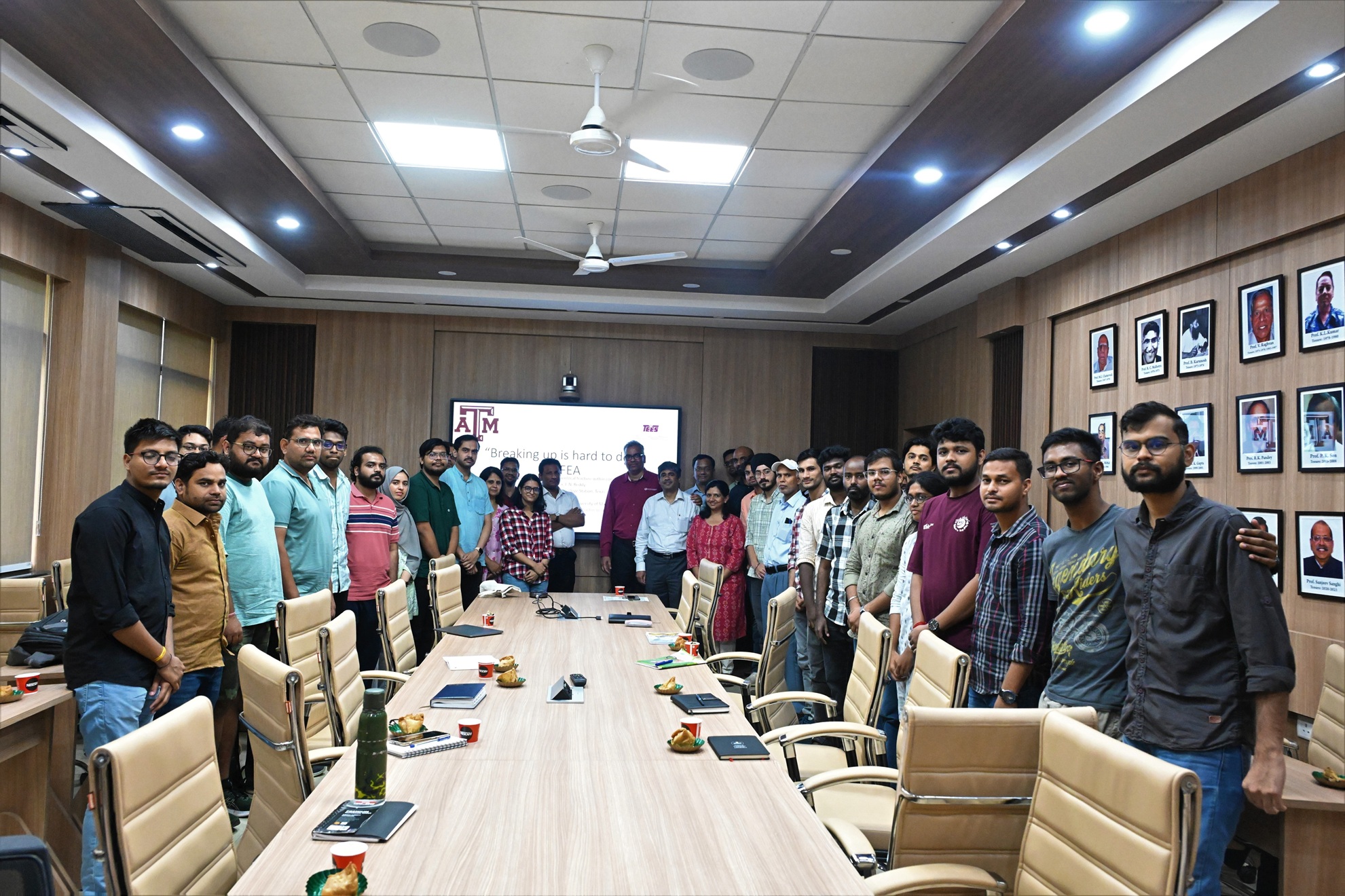 Group Photograph of Audience
Group Photograph of Audience
Pictorial Delight of Seminar on “Graph-Based Nonlocal Mechanics”
INAE Kolkata Chapter
Celebrating the National Engineers’ Day 2025
Engineers’ Day Lecture 2025 was jointly organized by the West Bengal Academy of Science and Technology and the Indian National Academy of Engineering – Kolkata Chapter, in association with Jadavpur University (JU). The event was held at the Seminar Hall of the Department of Mechanical Engineering, JU, to commemorate the birth anniversary of Bharat Ratna Sir Mokshagundam Visvesvaraya, revered as the Father of Indian Engineering. This year’s lecture, titled “The Challenge of Critical Materials, Energy Transition and Finding Indian Solutions”, was delivered by Dr. Debashish Bhattacharjee, one of India’s leading material scientists and a globally recognized figure. With an illustrious career as Managing Partner at Lionstead Ventures, Professor of Practice at IIT Madras, and former Vice President of Technology & R&D at Tata Steel, Dr. Bhattacharjee brought unmatched expertise to the session. His address offered deep insights into one of the most pressing challenges of our times, while inspiring the next generation of engineers to pursue innovative, India-centric solutions.
At the outset, Prof. Swarnendu Sen, H.O.D. Mechanical Engineering of JU welcomed the audience and expressed his earnest gratitude to the distinguished speakers and guests. Subsequently, Prof. Ranjan Ganguly, Treasurer cum Secretary of INAE-Kolkata Chapter and Convener of the Sectional Committee IV of WAST, introduced the speaker to the audience. He also read out a welcome note of Prof. Malay Kundu, Prof. ISI and President of INAE Kolkata Chapter.
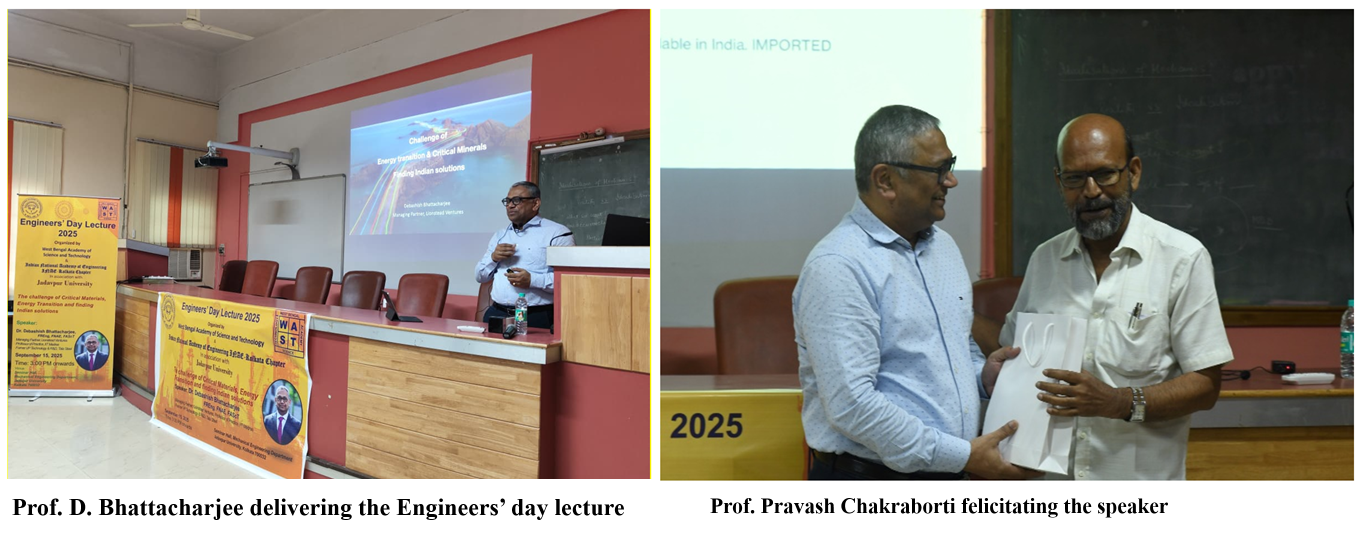
The discussions on the first day also addressed critical issues, with Dr. Vibha Tripathi leading a session on overcoming barriers faced by women in technology, including gender bias, lack of mentorship, and work-life balance challenges. Another dynamic panel featuring Dr. Vibha Tripathi, Founder, Boon, Ms. Anushree Srivastava, Director Grey Matterz, Managing Partner GOFI and Prof. D. Boolchandani, ECE Department, MNIT Jaipur explored how women entrepreneurs can leverage innovation to launch and sustain successful tech ventures. The day concluded with an insightful session on soft skills development by Prof. Sivaji Chakravorti, Vice President, INAE who underscored the significance of communication, leadership, and teamwork in advancing women’s careers.
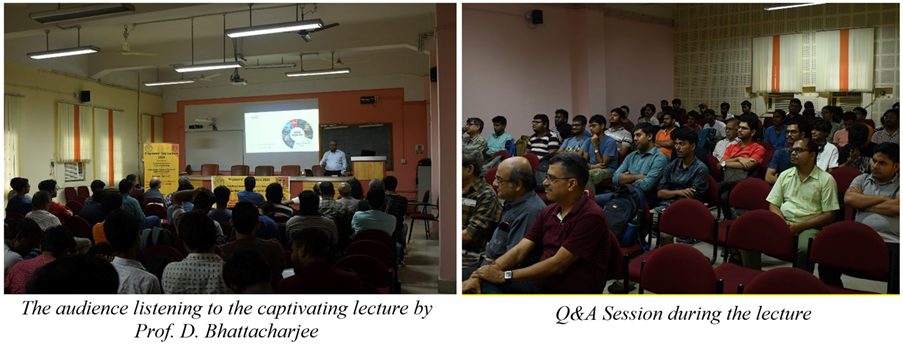
At the end of the lecture an engaging Q&A session followed where both the INAE and WAST fellows, other faculty members, research scholars and students interacted with the speaker. The programme concluded with a Vote of Thanks delivered by Prof. Ranjan Ganguly on behalf of INAE Kolkata Chapter, and WAST followed by Prof. Pravash Chakraborti presenting a memento to the speaker.
INAE Mumbai Chapter
INAE Mumbai Chapter’s Student Outreach Programme
INAE Mumbai Chapter organized a Student Outreach Programme at Vivekanand Educational Society’s Institute of Technology, Chembur, Mumbai on July 31, 2025 from 13:30 to 15:30 hrs. The programme commenced with welcoming of Mr. A.K. Balasubrahmanian, Co-Chair, INAE Mumbai Chapter and Dr. Padmanabhan Mahadevan, Outstanding Scientist, BARC & the Speaker, by Dr. Jayalekshmi Nair, Principal, VESIT, Dr. Sangeeta Prasanna, HOD, Automation & Robotics Engineering, VESIT and faculty members of VESIT.
Mr. Balasubrahmanian made introductory remarks and brought out briefly the objectives and activities of INAE. Dr. Padmanabhan made a presentation on ‘Evolution of Engineering as Backbone of Modern Society’, with fascinating examples and historical events to highlight the importance of engineering in the modern world. The presentation showcased important scientific and technological advancements in the history and its role in shaping the evolution of human society. It also showed interdependence of various engineering fields in the advancement of modern technology, emphasizing the need for continued developmental work in all engineering domains for sustained technological progress.
The presentation was followed by interaction with the students and faculty on various related topics. About 230 students of third year engineering from Automation & Robotics, Electronics & Telecommunication and Electronics & Computer Science branches and their faculty members participated in the programme. VESIT management appreciated the programme and opined that it will benefit the students and help in widening their understanding.
Photographs from the event are given below:
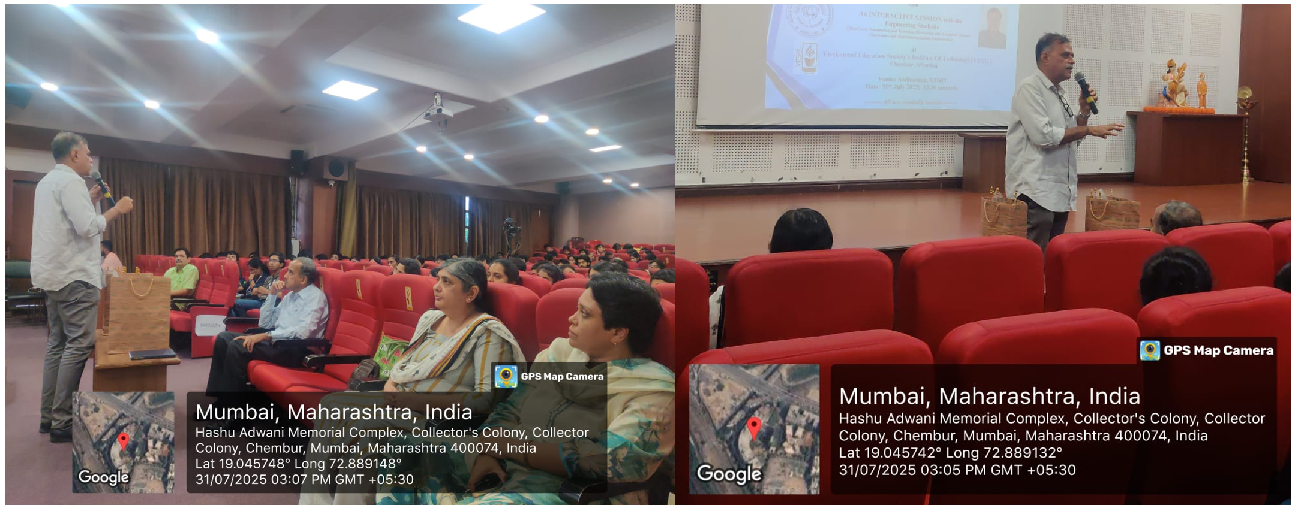
INAE Mumbai Chapter Webinar on “Readiness of Indian Industries for Energy Transition”
INAE Mumbai Chapter organized a Webinar on “Readiness of Indian Industries for Energy Transition” by Mr. Praveen Bhatt, Vice President & Head of the Nuclear Business, L&T Heavy Engineering on 9th August, 2025 at 4:00 PM (16:00 hrs) in hybrid mode at BARC Training School Hostel Anushaktinagar, Mumbai.
The programme started with welcoming the speakers and distinguished participants by Dr. Gopika Vinod, Secretary, INAE Mumbai Chapter. Honorable Co-Chair, Mr. A.K. Balasubrahmanian made introductory remarks and emphasised the importance of the topic of the webinar. The Talk by Mr. Praveen Bhatt covered topics viz. India’s Energy Transition, giving the overview of India’s energy demand and role of Nuclear Energy, GOI’s plan for Nuclear Energy 100Gwe by 2047, Role of private sector, Industries readiness and Policy framework. Further, Mr. Praveen Bhatt presented activities in Larsen & Toubro as trend setter in High-tech Manufacturing, highlighting End-to-End Capabilities – Engineering, procurement, manufacturing, and construction (EPCM) strengths. In addition, the Talk showcased specialized facilities, modular construction and advanced manufacturing, use of IIoTs and Smart station in ETO (Engineer to Order) industry, Productivity /Quality improvement using technology and use of future technology i.e. AI, ML, Robotics, Laser Technology etc in manufacturing. The Talk provided an overview of the current advances in manufacturing and the likely scenario driven by emerging technologies, supporting the aspirations for energy transition and growth for the nation. Dr. R. B. Grover gave concluding remarks, emphasising on economical aspects of power generation, need for automation in industries and effect on reducing production cycle time, etc. Prof. Santanu Bandopadhayay thanked the speaker for the inspiring and informative session. The webinar had a good number of online and in-person participation.
Photographs from the event are given below.

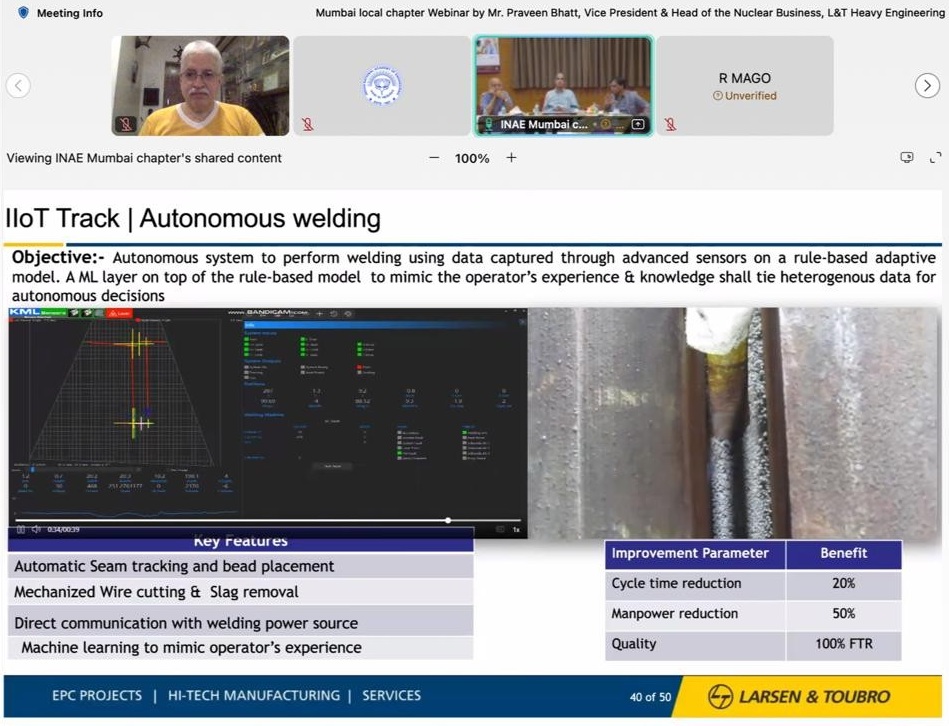
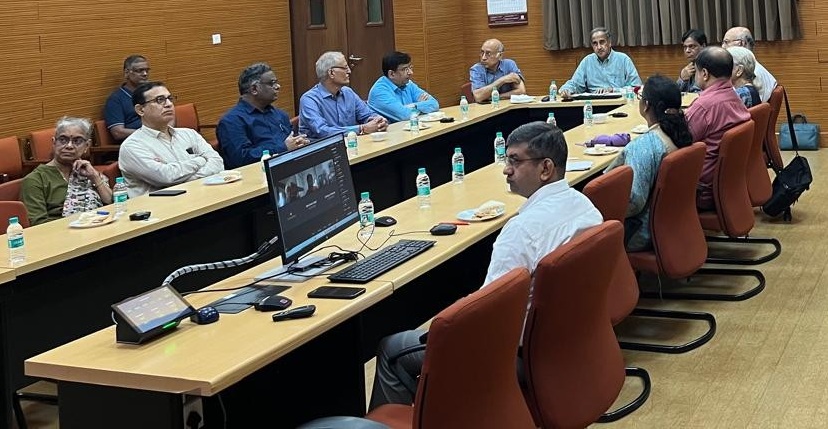
INAE Mumbai Chapter’s Student Outreach Programme at VJTI
INAE Mumbai Chapter organized a Student Outreach Programme at Veermata Jijabai Technological Institute (VJTI), Mumbai, Mumbai on September 26, 2025 from 15:00 to 17:00 hrs. This programme was organized as part of Engineers’ day celebration. The programme commenced with welcoming of Mr. A.K. Balasubrahmanian, Co-Chair, INAE Mumbai Chapter, Mr. Padmanabhan Mahadevan, Outstanding Scientist, BARC & the Speaker, Dr. Gopika Vinod, Secretary, INAE Mumbai Chapter by Prof. Sachin Kore, Director, VJTI, Prof. R. N. Awale, Deputy Director, VJTI, Prof. Krishna Kanakgiri, Asst. Professor, Electrical Engineering Department and faculty members of VJTI.
Mr. Balasubrahmanian made introductory remarks and brought out briefly the importance of Engineers’ Day, the theme of Engineers’ Day this year, viz., “Deep Tech & Engineering Excellence: Driving India’s Techade” and objectives and activities of INAE. Mr. Padmanabhan made a presentation on “From Volta to Hinton: March of Electrical Sciences”, with fascinating examples and historical events to highlight the importance of engineering in the modern world. The presentation showcased the evolution of Electrical Sciences right from the invention of technologies for Electric Power Generation to present day Computing, Networking and AI Technologies, highlighting major innovations. It also showed interdependence of various engineering fields in the advancement of modern technology, emphasizing the need for continued collaborative developmental work in all engineering domains for sustained technological progress.
The presentation was followed by interaction with the students and faculty on various related topics like the innovation prediction for coming decade, skill sets required for young students, role of Deep Tech in career of future generation, etc. About 200 students of third year engineering from Electrical Engineering, Electronics & Telecommunication and Electronics & Computer Science branches and their faculty members participated in the programme. VJTI management appreciated the programme and opined that it will benefit the students and help in widening their understanding.
Photographs from the event are given below:
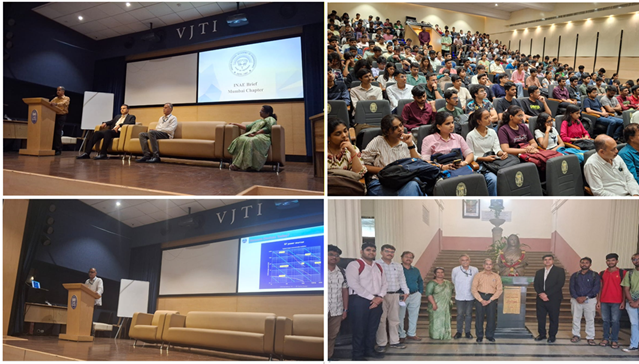
INAE Chennai Chapter
(i) Webinar co-hosted by ISHMT and INAE Chennai Chapter – 17th talk in the ISHMT Golden Jubilee Webinar series in partnership with INAE Chennai Chapter
A Webinar was co-hosted by ISHMT and INAE Chennai Chapter as the 17th talk in the ISHMT Golden Jubilee Webinar series in partnership with INAE Chennai Chapter on 12th July 2025 and delivered by Dr. Venkata Raghavendra, Group Director, Thermal Systems Group, at ISRO’s UR Rao Satellite Centre on the topic “Spacecraft environment & its effect on Thermal systems design”.
Abstract
Spacecraft environment has a greater role in the design of a suitable thermal control system for any spacecraft. Thermal control system design shall ensure that, temperature of the spacecraft & all its subsystems are maintained within their acceptance temperatures, irrespective of its environmental conditions. All spacecraft are exposed to convective environment in launch pad and also during launch. Spacecraft also experience aerodynamic heating during its ascent, once the heat shield of the launch vehicle is opened. Conduction and radiation are the prevalent modes of heat transfer for spacecraft in the orbit. Once in Earth’s lower orbits, spacecraft receives heat load from Earth and Sun and also radiates heat back to Space. For spacecraft in geosynchronous / geostationary orbits, effect of heat load from Earth is minimum. Spacecraft of inter-planetary missions, receive heat load from the respective inter-planetary bodies, such as, Moon, Mars, Venus, etc. Heat loads incident on a spacecraft from a planetary body is of two types; one is IR heat load due to its own temperature and the other is reflected heat load (albedo) from Sun. Thermo-optical properties of different surfaces of the spacecraft for absorbing, reflecting and radiating the heat loads from external sources dictates the design of a suitable thermal control system. The Webinar talk on ‘Spacecraft environment & its effect on thermal systems design’ gives overall view of different environments for which a spacecraft is exposed during different phases of its mission, effects of these environments to thermal systems design and use of suitable thermal control elements to make appropriate use of environmental effects to maintain the temperatures.
Brief Bio of the Speaker:
Dr. Venkata Raghavendra is Scientist / Engineer-G and Group Director, Thermal Systems Group, at ISRO’s UR Rao Satellite Centre. Since joining ISRO in 1998, he has led thermal design for RISAT-1 and served as Deputy Project Director (Thermal Systems) for Chandrayaan-2, Chandrayaan-3, and NISAR. He earlier headed the Heat Pipe Section (2014–19) and Advanced Thermal Control Division (2020–24). His expertise spans spacecraft thermal control, heat pipes, phase-change materials, and high-conductance thermal straps. Raghavendra holds a B.E. (UVCE, Bangalore), M.Tech. (NITK, Surathkal), and Ph.D. (IISc, Bangalore). Honors include the ISRO Team Award (2013) and national and international laurels for Chandrayaan-3 (2024). He has 25 + publications, 100 + internal ISRO reports, has transferred heat-pipe technology to Indian industry, serves as a reviewer for Elsevier’s “Thermal Science and Engineering Progress,” and is a life member of ASI and ISHMT.
(ii) Webinar co-hosted by ISHMT and INAE Chennai Chapter – 18th talk in the ISHMT Golden Jubilee Webinar series in partnership with INAE Chennai Chapter
A Webinar was co-hosted by ISHMT and INAE Chennai Chapter as the 18th talk in the ISHMT Golden Jubilee Webinar series in partnership with INAE Chennai Chapter on 9th August 2025 delivered by Prof. Dr.-Ing. Bernhard Weigand, Institute of Aerospace Thermodynamics, University of Stuttgart, Germany on the topic “Swirl Cooling, a Promising Method for Cooling Gas Turbine Blades”.
Abstract
The major goals for industrial gas turbines and gas turbines used for propulsion are to reduce the fuel consumption and the pollutant emissions. This can be achieved by increasing the thermal efficiency of the gas turbine operating at increasingly higher temperatures. These temperatures are well above the melting temperatures of the blade materials, which requires e.g. the development of more efficient internal turbine blade cooling strategies. Currently different cooling techniques are investigated like rib turbulators, pin fins, jet impingement, swirl cooling and dimples. Here, swirl cooling is a promising cooling method as it promotes a high turbulent mixing in the near wall region and provides high heat transfer enhancement capabilities. This cooling method has been investigated at the Institute of Aerospace Thermodynamics (ITLR) at the University of Stuttgart for a long time in several basic research studies. The presentation will show some selected results of our numerical and experimental investigations of this promising internal cooling method for gas turbine blades.
Brief Bio of the Speaker:
Bernhard Weigand is Professor for Thermodynamics at the University of Stuttgart in Germany. He is the director of the institute of Aerospace Thermodynamics (ITLR) at the faculty of Aeronautics and Astronautics and Geodesy. He studied Mechanical Engineering at the TU Darmstadt. After his Ph.D. at TU Darmstadt in 1992 he joined ABB Power Generation in Switzerland where he worked up to March 1999. In parallel to his work at ABB, Bernhard Weigand obtained his habilitation at TU Darmstadt in 1997. In April 1999 be moved to the University of Stuttgart, where he was from 2002-2006 dean of the faculty of Aeronautics and Astronautics and Geodesy. From 2006-2009 he was vice rector for structure and organization at the University of Stuttgart. He served as an Editor of the Int. Journal Heat Mass Transfer from 2012 – 2023 and from 2012 – 2018 he was editor of the Int. Comm. in Heat Mass Transfer. Since 2011, he serves as an Editor of the Book Series Mathematical Engineering. He is an elected member of Acatech (National Academy of Science and Engineering) and an elected member of the Heidelberg Academy of Sciences and Humanities. He was the speaker of the collaborative research center SFB-TRR 75 from 2010-2022 and he is the speaker of the international research training group GRK 2160 since 2016. His research is concerned with thermodynamics, numerical and experimental investigations of droplet dynamics and heat transfer enhancement.
(iii) Engineers Day 2025 celebrations jointly organized by INAE Chennai Chapter with IIT Madras conducting a One Day Workshop ISAM on “Advances in Biosensor Technologies”.
Engineers Day 2025 celebrations were organized by INAE Chennai Chapter jointly with IIT Madras, conducting One-day Workshop ISAM on “Advances in Biosensor Technologies” on September 15, 2025, wherein the Valedictory Talk was delivered on the topic “From the LAB to the CLINIC – Transitioning point-of-care testing technologies in the Indian context” by Dr. Dhananjaya Dendukuri, FNAE, Chief Executive Officer & Co-Founder of Achira Labs. on 15th September 2025.
Number of participants: 44
Brief Description of the Workshop: It was a one-day workshop on “Advances in Biosensors Technologies” held on Engineer’s Day in association with INAE Chennai Chapter and ISAM. The workshop was open to any scholar or faculty who are working in relevant fields of research. There were five sessions in the morning. In the afternoon, participants were given hands-on training in fiber optic biosensors in the Biosensors lab, AMBE, IITM where participants could process optical fibers for fabrication of U-FOS probe, perform some optical experiments, learn about device development stages, and utilize equipment developed using U-FOS technologies for RI sensing. The workshop closed with the valedictory talk on the topic “From the LAB to the CLINIC – Transitioning point-of-care testing technologies in the Indian context” by Dr. Dhananjaya Dendukuri, FNAE, Chief Executive Officer & Co-Founder of Achira Labs.
Brief Bio of speaker for the valedictory talk:
Dr. Dhananjaya Dendukuri is Chief Executive Officer & Co-Founder of Achira Labs. He did his B.Tech in Chemical Engineering from the Indian Institute of Technology, Madras where he received the ‘Institute Blue’. He obtained a MASC in Chemical Engineering from the University of Toronto. He received his PhD in Chemical Engineering from MIT in 2007 where his thesis work received the Senturia Prize for the best dissertation in the area of micro and nanotechnology. He returned to India with his passion for engineering and belief that there is no better context for specific technology development that can be translated into solutions that have a big impact and unserved markets. He was named as one of 20 individuals to receive the Massachusetts Institute of Technology’s (MIT’s) Technology Review’s prestigious TR35 awards in India for the work that was being done at Achira.
Brief Bio of speakers who handled the morning sessions:
Dr. M S Narayanan holds expertise in Healthcare Engineering, in general, and clinical diagnostic platforms and microfluidic biosensors, in particular. His current research interests border upon decentralization of healthcare and medical technologies via point-of-care clinically relevant platforms for utilitarian impact in resource-limited settings. He holds a PhD on ‘Biomimetic Systems’ from the Max Planck Institute of Colloids & Interfaces, and the Fraunhofer Institute for Biomedical Engineering, in Germany (2008-2012). He was selected for a Marie Curie Fellowship and worked in a pan-European cancer diagnostics network. He then worked as a Senior Scientist and Research Manager at the Molecular Diagnostics unit of the Science for Life Laboratory at the Karolinska Hospital Campus, Sweden. Subsequently, he took up a Ramalingaswami Re-Entry Fellowship at IIT Madras. He later joined the Department of Medical Sciences and Technology at IITM.
Dr. Sanjukta Patra graduated with a PhD in Biotechnology from the Central Food Technological Research Institute, Mysore, Karnataka. Her PhD research led to a patented biotransformation process for the production of theophylline. Post PhD she led the “Enzyme and Microbial Technology” research group at IIT Guwahati at the department of Biosciences and Bioengineering. The major focus of the research group had been on different spectrums of Diagnosis & Therapeutics, Aptasensing, enzyme based sensors and molecular diagnosis, process development for biomolecules for healthcare and sensor development for environmental applications. Her research impact distribution is across 12/17 SDGs. She is currently faculty at medical science and technology dept, IIT Madras.
Prof. Ramanathan Srinivasan obtained his B.Tech. in Chemical Engineering from A.C. Tech, Anna University in 1993. He completed his Masters. (Chem. Engg.) in 1996 and Ph.D. (Chem. Engg.) in 2000 from Clarkson University and joined PDF Solutions, USA as a Senior Consulting Engineer. He joined IIT Madras as faculty in 2003 and is currently working as a Professor in the Department of Chemical Engineering, IIT Madras. His main field of specialization is in the application of electrochemical impedance spectroscopy to obtain mechanistic information of electrochemical reactions. He has created freely available 30 hours of video lectures on electrochemical impedance spectroscopy under the auspices of NPTEL, India.
Prof. V.V. Raghavendra Sai received the Ph.D. degree in biomedical engineering from the Indian Institute of Technology, Bombay, in 2009, for the work done on development of two novel fiber optic biosensing technologies for detection of biomolecules and pathogens. He spent two years of postdoctoral fellowship at the University of Idaho, USA, working on development of SERS-based DNA biosensor, receptor mediated detection of explosives, and application of nanomaterials for development of drug delivery systems for anti-sense and anti-gene oligonucleotide-based therapeutics. In 2011, he came back to India and joined as a faculty in the Department of Applied Mechanics and Biomedical Engineering, IIT Madras, where he established biosensors laboratory to focus on development of affordable and indigenous technologies for clinical diagnostics, water, food, and environmental monitoring.
Dr. Chirasree RoyChaudhuri is a faculty in the Department of Electronics and Telecommunication Engineering of Indian Institute of Engineering Science and Technology Shibpur. She did her BE from Jadavpur University in Electronics and Instrumentation, and Masters in Electron device and Ph.D. in MEMS based porous silicon pressure sensor. She has been engaged in interdisciplinary research in the area of electrical biosensors, chemical sensors, point-of-care devices and related signal processing with the aim to develop point of care devices. She is a recipient of Young Engineer Award from Indian National Academy of Engineering (INAE), Young Scientist Award from National Academy of Science, India (NASI) and Institute of Smart Materials Structures and Systems and Women Excellence Award from DST, Government of India.
Schedule and speakers/experts:
| S.No. | Title | Time | Speaker | Affiliation |
|---|---|---|---|---|
| 1 | DNA diagnostic technologies | 9.05 – 09.50 AM | Prof. M S Narayanan | MST, IITM |
| 2 | Aptasensing – scope and challenges | 9.50 – 10.35 AM | Prof. Sanjukta Patra | MST, IITM |
| 3 | Electrochemical Techniques | 10.35 – 11.20 AM | Prof. Ramanathan | ChemE, IITM |
| 4 | Optical Techniques | 11.35 – 12.20 AM | Prof. V V Raghavendra Sai | AMBE, IITM |
| 5 | Electrical Impedance Techniques | 12.20 – 1.00 PM | Prof. Chirasree RoyChaudhuri | ETE, IIEST |
| 6 | Hands-on session | 2.00 – 4.00 PM | Biosensors Lab | AMBE, IITM |
| 7 | Valedictory Talk | 4.00 – 5.00 PM | Dr. Dhananjaya Dendukuri | FNAE, CEO & Co-Founder of Achira Labs |


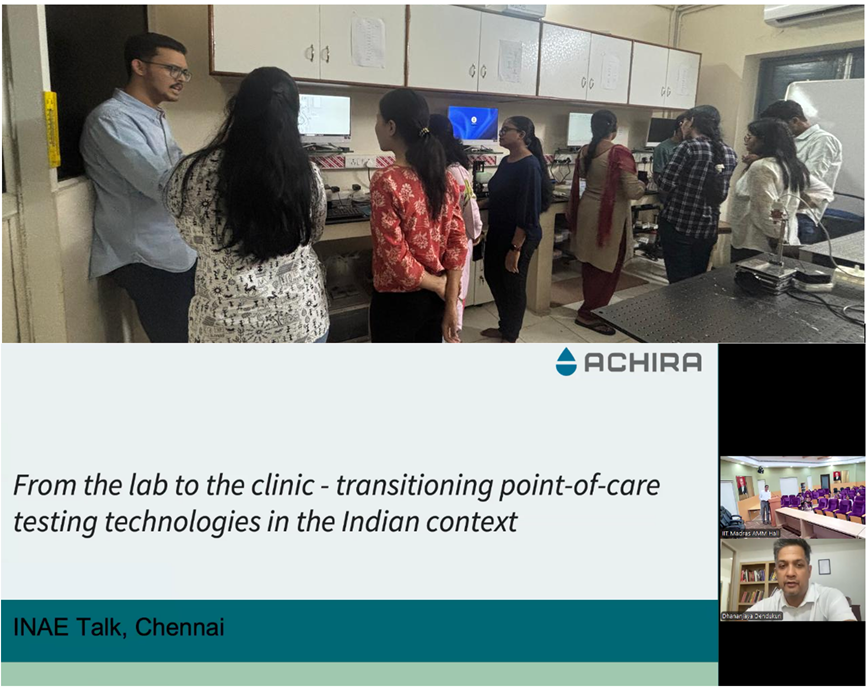
(iv) Webinar co-hosted by ISHMT and INAE Chennai Chapter – 19th talk in the ISHMT Golden Jubilee Webinar series in partnership with INAE Chennai Chapter. delivered by Prof. Junichiro Shiomi, Professor in the Institute of Engineering Innovation and Department of Mechanical Engineering, School of Engineering, University of Tokyo.
A Webinar was co-hosted by ISHMT and INAE Chennai Chapter and delivered by Prof. Junichiro Shiomi, Professor in the Institute of Engineering Innovation and Department of Mechanical Engineering, School of Engineering, University of Tokyo on 8th October 2025 on the topic “Materials informatics for heat transfer and beyond”.
Abstract:
In this talk, series of works on materials informatics (MI) for heat transfer and beyond, carried out in the Thermal Energy Engineering Lab (TEEL) at the University of Tokyo, together with the collaborators were discussed. MI is a scientific discipline that combines materials science and data science to accelerate materials development and has been growing rapidly in recent years with the expansion of materials data and the development of techniques for modelling and optimizing composition/structure and property/function through machine learning. Its fundamental significance lies in the exploration of materials at speeds, horizons, and dimensions that surpass those of humans, through black box learning of large-scale data. This requires large-scale data, but data generation for materials is generally expensive, so data generation has often been done computationally. In this course, the researchers have computationally designed and experimentally realized various nanostructures that optimally control lattice heat conduction or radiative heat transfer. These machine-learning optimizations can be also used to gain physical insights through reverse science and human-AI collaborations. On the other hand, large-scale data generation including process parameters in experiments is still indispensable because the materials calculation does not guarantee the accuracy when the complexity of composition and structure increases, because many materials are in a metastable state and their structure and physical properties are highly dependent on the fabrication process. To overcome this, they been working to automate the fabrication, moulding, and evaluation processes of composite materials consisting of polymer matrices and dielectric fillers for sky radiator and electronics packaging.
Brief Bio of the speaker:
Dr. Junichiro Shiomi is Professor in Institute of Engineering Innovation and Department of Mechanical Engineering, School of Engineering, the University of Tokyo. He is also currently Assistant Dean of School of Engineering, the University of Tokyo. He received B.E. (1999) from Tohoku University, and Ph. D. (2004) from Royal Institute of Technology (KTH), Sweden. Leading the Thermal Energy Engineering Lab, he has been pursuing research to advance thermal management, waste heat recovery, and energy harvesting technologies based on nano-to-macro innovation and materials informatics of materials, structures, and systems. He is fellow of Japan Society of Mechanical Engineers and members of Science Council of Japan and Engineering Academy of Japan. He serves as an associate editor of Nanoscale and Microscale Thermophysical Engineering. He is a recipient of the Zeldovich Medal from the Committee on Space Research, the Commendation for Science and Technology by the Minister of Educational, Culture, Sports, Science and Technology, the Academic award of Heat Transfer Society of Japan, the Academic Award of Thermoelectric Society of Japan, the JSPS Prize, and the Nukiyama Memorial Award.
INAE Bangalore Chapter
Prof. Roddam Narasimha Memorial Lecture
The Indian National Academy of Engineering Bangalore Chapter and CSIR-NAL has jointly organized the Roddam Narasimha Memorial Lecture, which is organized every year on his birthday (July 20th) at CSIR-NAL. This memorial lecture series was started in 2020. This year, 20th July 2025 being a holiday, the lecture was held on Monday the 21nd of July, at the SR Valluri Auditorium of CSIR-NAL. Dr L Venkatakrishnan, Head, EAD, CSIR-NAL, welcomed the gathering and introduced the speaker. The event was presided over by Dr Harish Barshilia. The Speaker for this year was Prof. Jaywant Arakeri, Professor Emeritus, Indian Institute of Science, Bangalore. He spoke on “Fishy Tales and Wagging Tales: Underwater Locomotion”. The talk was attended by participants from CSIR-NAL as well as IISc and also webcast.
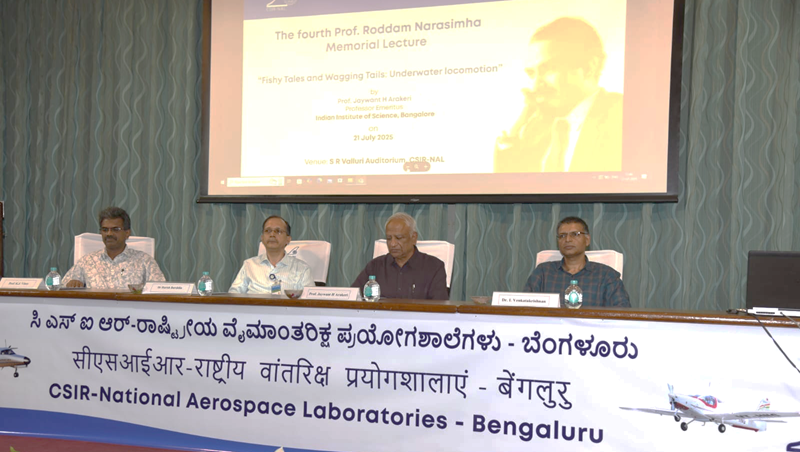
PARYAVARAN 2025
On the occasion of Sir M Visvesvaraya’s birthday on 15th September 2025, which is celebrated as Engineers’ Day every year on 15th September, the Indian National Academy of Engineering (INAE), Bangalore Chapter and Gokula Education Foundation, Bengaluru organized the third one-day workshop on Environment and Green Energy – PARYAVARAN 2025 at Ramaiah Institute of Technology, Bangalore. The program was inaugurated by Padma Vibhushan Dr. V. K. Aatre, Former Scientific Advisor to Raksha Mantri and presided by Chairman, Gokula Education Foundation, Dr. M. R. Seetharam. Other dignitaries included Prof. S. Gopalakrishnan, President, INAE Bangalore Chapter, and Dr. N.V.R. Naidu, Principal, Ramaiah Institute of Technology.
During the inaugural function, the chief guest Dr. V. K. Aatre highlighted the importance of safeguarding our planet, stressing that even small individual efforts can significantly contribute to sustainable development. Dr. M. R. Seetharam, in his presidential address, further underscored the various sustainability initiatives undertaken by Ramaiah Institutions to protect the environment.
The inaugural function was followed by technical talks by eminent scientists. Prof. P.N. Vinayachandran, Professor and Chairman, Centre for Atmospheric and Oceanic Sciences, IISc Bengaluru, delivered the first invited talk titled “Chronicle of an Oceanographic Field Experiment.” He shared insights into large-scale ocean expeditions and explained how oceanographic research contributes to understanding climate change, marine ecosystems, and sustainable resource utilization. His presentation highlighted the critical link between oceans and the global climate system.
The second invited talk was delivered by Prof. Srisha Rao M. V., Professor, Department of Aerospace Engineering, IISc Bengaluru, on the topic “Unlocking CO₂ Gasdynamics: A Natural Working Fluid for Sustainable Energy Systems.” Prof. Rao emphasized the role of carbon dioxide as an innovative and environmentally friendly medium for energy conversion systems. He explained how novel approaches in CO₂ gas dynamics can open new frontiers for sustainable energy technologies, making them more efficient and less dependent on fossil fuels.
Later in the afternoon, Dr. Archna, Registrar (Academic) and Professor, Department of Chemical Engineering, Ramaiah Institute of Technology, Bengaluru, delivered an invited talk on “Securing the Blue Gold.” Her session focused on the urgent need to conserve and manage water resources, which are often referred to as “blue gold.” She highlighted challenges such as water scarcity, pollution, and climate impacts, while also presenting strategies for sustainable water management at institutional, community, and policy levels.
The day-long program also included 28 paper and poster presentations by students from seven engineering colleges across Bangalore. A total of four cash prizes were awarded to students in the paper and poster presentation categories. The workshop concluded with a vote of thanks and the distribution of prizes and certificates.
The details of the prize winners are as follows
Oral Presentation
| S.No. | Title of the Paper | Students | College | Prize Money |
| 1 | A Low cost Nature based Rainwater filtration using coconut coir | Arpit Anand
Chandan Kumar CL |
MS Ramaiah Institute of Technology | Rs. 15,000 |
| 2 | H2 Vision | Seema Sultana
Siddique Jaffer Shafeeq Shaikh Mohammed Aman Syed Mohammed Mannan |
HKBK College of Engineering | Rs. 10,000 |
Poster Presentation
| S.No. | Title of the Poster | Students | College | Prize Money |
| 1 | Okra Mucilage-Cellulose Nanocomposite membranes for water filteration | Samhitha Jp
Ravisagar K Zayaan Hussain |
MS Ramaiah Institute of Technology | RS. 10,000 |
| 2 | Cost Effective IoT based air quality monitoring system | Aarya K Niranjan
Aayush Mishra Abhinav Anand Udyat S
|
RNS Institute of Technology | Rs. 5000 |




INAE Forums
One of the important objectives of the Academy is to assist the Government from time to time in formulating policies on critical technical issues. For this purpose, five forums were constituted – INAE Forums on Energy; Technology, Foresight and Management; Engineering Interventions for Disaster Mitigation; Indian Landscape of Advanced Structural Materials and Civil Infrastructure. These forums enable giving inputs to policy makers, institutes of higher learning & research, industries, etc. The following are the updates on activities carried out during the year.
INAE Technology Conclave 2025 -Post-Event Report
The Indian National Academy of Engineering (INAE) jointly with IIT Bombay had successfully organized the INAE Technology Conclave 2025 on August 30, 2025, at IIT Bombay. The Conclave on the theme, “Sustainability of Civil Infrastructure in India,” brought together 100+ eminent experts, academicians, industry leaders, and young professionals to deliberate on the challenges and opportunities in creating sustainable, resilient, and future-ready infrastructure.
The conclave began with a Welcome Address by Prof. D.N. Singh, followed by an address from Mr. J.D. Patil, President, INAE, who highlighted the Academy’s commitment to advancing engineering solutions for national priorities. Prof. Prem Krishna, Chairman, INAE Forum on Civil Infrastructure then presented an overview of the ongoing INAE study and offered a perspective on the significance of the conclave. This was followed by introductions from participants, setting the tone for an engaging and collaborative day of discussions.

INAE Technology Conclave in progress at IIT Bombay
The first technical session featured a series of expert talks on multiple facets of sustainability in civil infrastructure covering its diverse dimensions. The discussions addressed the growing infrastructure demand and the need for sustainable habitat development, along with the importance of environmental impact assessment and life cycle cost analysis. The session also highlighted innovations in sustainable construction materials and related educational initiatives, as well as perspectives on sustainable design and construction practices. Attention was given to the role of policies and standardization in mainstreaming sustainability, and the relevance of sustainable approaches in achieving Net Zero goals. A global perspective was also shared, emphasizing the potential of the Triple Helix model to build smart and sustainable futures in both Africa and India. Together, these contributions set a comprehensive framework for advancing sustainability in the sector.
The session emphasized the integration of innovative materials, design practices, and policies into mainstream infrastructure development, highlighting global best practices alongside India’s unique challenges. The afternoon session was dedicated to presentations by participants, where young researchers and practitioners showcased their work and shared insights. This interactive session fostered dialogue across academia, industry, and government representatives, ensuring a multi-stakeholder perspective.
The day concluded with a Panel Discussion led by Dr. P.K. Sikdar, joined by participating industry experts. The panel deliberated on the way forward for India’s civil infrastructure sector, emphasizing actionable strategies, cross-sector collaborations, and the role of engineering innovation in achieving sustainability goals. The deliberations at the Conclave highlighted that sustainability must be integrated at every stage of civil infrastructure development, from design and construction to long-term operation and maintenance. Strong policy frameworks, effective standardization, and educational initiatives were identified as essential enablers for mainstreaming sustainable practices. The discussions emphasized that achieving India’s Net Zero goals will require innovations in construction materials, optimization of design, and adoption of life cycle cost analysis. Further, it was underlined that meaningful progress can only be achieved through close collaboration between academia, industry, and government, with the Triple Helix model offering a powerful framework for building smart, resilient, and future-ready infrastructure.
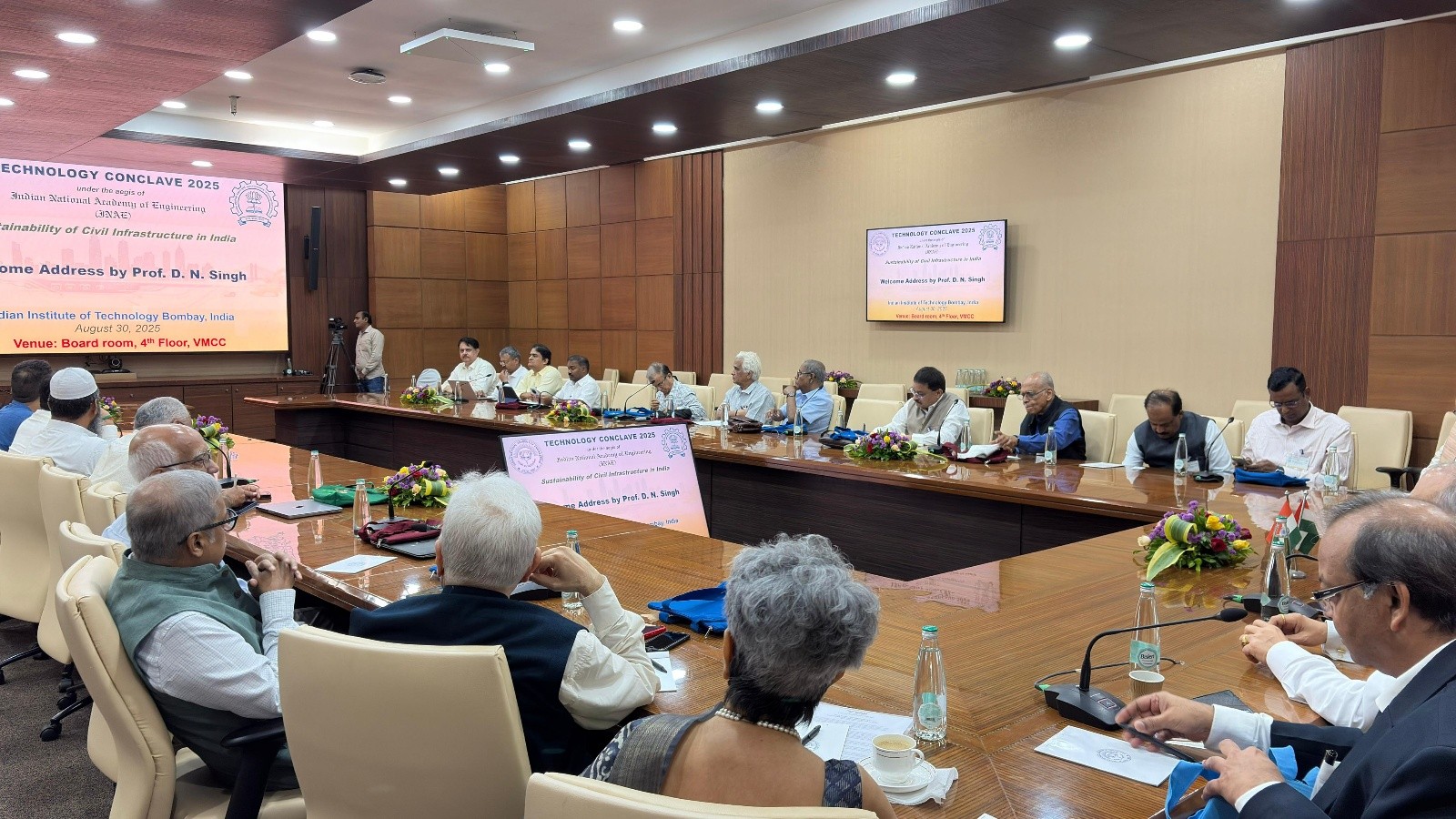
INAE Technology Conclave in progress at IIT Bombay
The INAE Technology Conclave 2025 provided an engaging platform for thought leadership and dialogue on sustainable civil infrastructure. With a rich mix of expert lectures, participant presentations, and a forward-looking panel discussion, the conclave successfully charted directions for advancing sustainable practices in India’s infrastructure development.
International Affairs
CAETS 2025 Annual Meeting and Convention
INAE Delegation led by Mr J.D Patil, President, INAE with Prof Indranil Manna, Immediate Former President, INAE and Prof UB Desai and Prof Sivaji Chakravorti- Vice-Presidents of INAE and Lt Col Shobhit Rai (Retd), Officiating Executive Director, INAE participated in the CAETS 2025 Annual Meeting and Conference on “Generations: Shaping a sustainable future in 50 years” held on September 8-11, 2025 at Brisbane, Australia. Mr J.D. Patil, President INAE attended meeting of the Board on September 8, 2025 and the Council Meeting and the Meeting of the Presidents of the Academies on September 9, 2025. Prof Indranil Manna, Chair, CAETS Engineering Education Working Group presented the report on September 9, 2025 on the study undertaken by the Group and the progress with discussion on way forward. Prof Sivaji Charkavorti was a panelist in Plenary session 2 on September 10, 2025 on “Climate Tech Collaboration: An Asia-Pacific partnership for prosperity”. The session brought together international authorities on ways to support equitable and innovative climate solutions in the region and globally.
Meetings were held on the sidelines of the CAETS Annual meeting between INAE delegation and representatives of with Royal Academy of Engineering (RAEng) UK, Engineering Academy of Japan, acatech, Germany and US National Academy of Engineering and National Academy of Engineering Korea wherein a number of possibilities were discussed for joint collaboration. One such important activity is being taken forward with planning of a joint event with RAEng, UK on the theme of “Critical Minerals” in March 2026. Lt Col Shobhit Rai (Retd) attended the meeting of the Executive Heads of Academies affiliated with CAETS. During this session on presentations by CAETS Committee Working Groups, a presentation was made by Lt Col Shobhit Rai (Retd) on behalf of Prof Prem Krishna on the theme of Sustainability during the CAETS Committee Working Group on Sustainability. The session was attended online by Mr Pradeep Chaturvedi, Vice President INAE.
 CAETS Council in Brisbane, 8 September 2025 Mr J.D. Patil, President, INAE (first row- second from left)
CAETS Council in Brisbane, 8 September 2025 Mr J.D. Patil, President, INAE (first row- second from left)
 Prof Sivaji Chakravorti (second from left) participating as a Panelist in the session on “Climate Tech Collaboration: An Asia-Pacific partnership for prosperity”
Prof Sivaji Chakravorti (second from left) participating as a Panelist in the session on “Climate Tech Collaboration: An Asia-Pacific partnership for prosperity”
8th INAE-NAEK Workshop on “Driving Innovation Together: AI and Semiconductors for a Smarter Future held on Aug 12-13, 2025 in hybrid mode
Inaugural Session
Prof. Euijoon Yoon, President, NAEK, opened the workshop by welcoming participants and emphasizing the strategic role of AI and semiconductors in shaping global innovation. He highlighted Korea’s leadership in semiconductor manufacturing and AI deployment, stressing that this workshop should serve as a platform for building long-term India–Korea research partnerships. He reaffirmed NAEK’s commitment to bilateral cooperation through knowledge exchange, joint projects, and talent mobility.
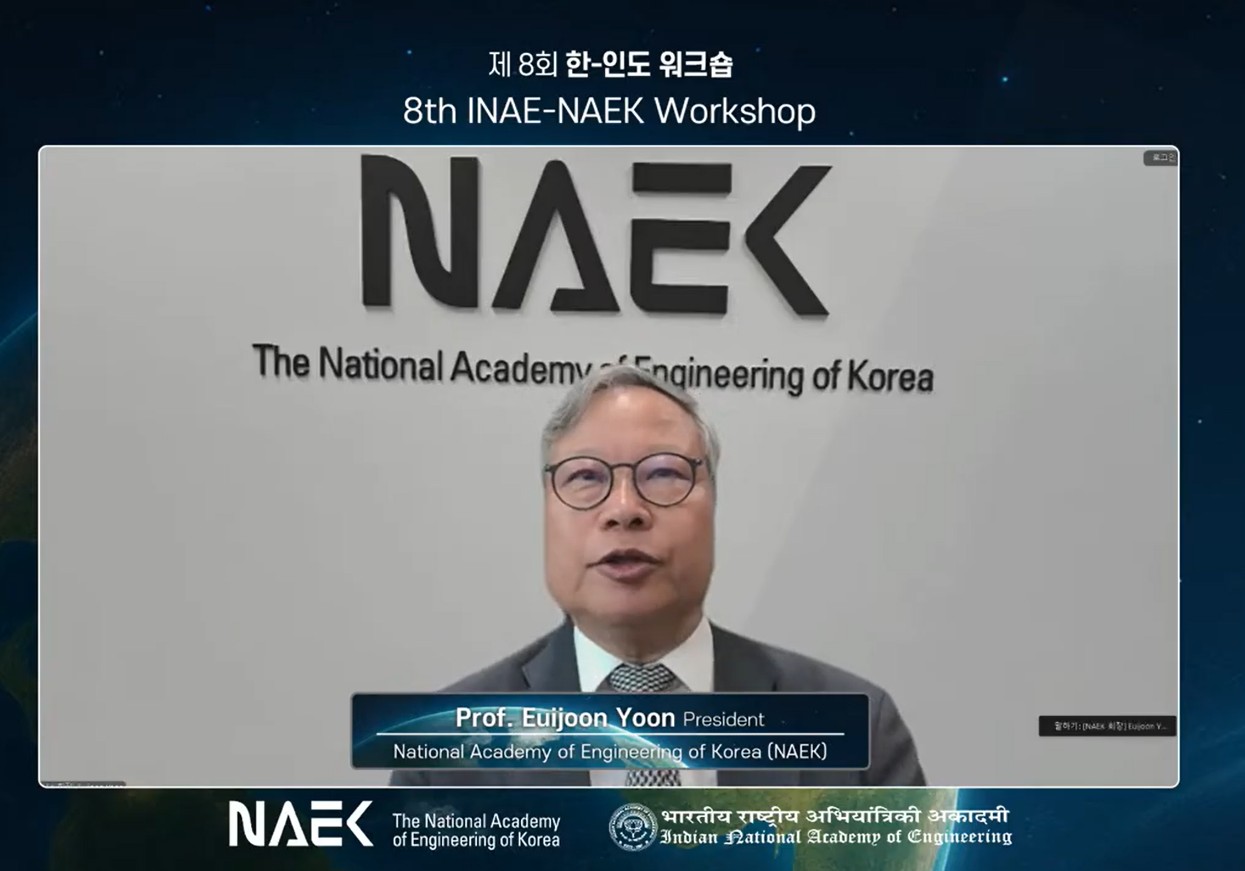 Prof Euijoon Yoon, President, NAEK delivering Opening Remarks
Prof Euijoon Yoon, President, NAEK delivering Opening Remarks
Mr. J. D. Patil, President, INAE, extended his greetings on behalf of the Indian National Academy of Engineering (INAE). He underlined India’s strengths in research talent, design expertise, and AI-driven ecosystems, noting the complementarity between India and Korea — with India excelling in system design and Korea in advanced manufacturing. He called for stronger academic–industry–government linkages and positioned the workshop as an opportunity to lay the foundation for future India–Korea innovation hubs in AI and semiconductors.
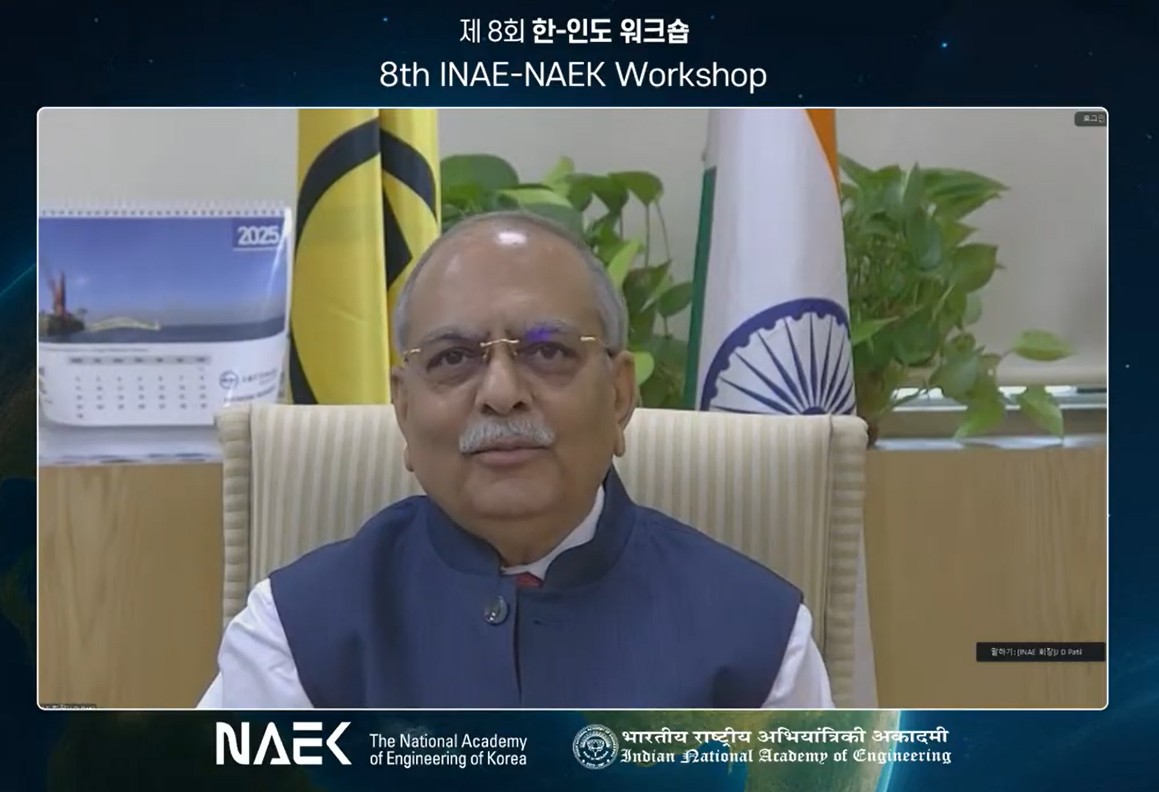 Mr J.D. Patil, President, INAE delivering Address
Mr J.D. Patil, President, INAE delivering Address
Day 1 – Technical Session on “Advancing the AI Sector through Smart Manufacturing and Global Collaboration”
Session 1: Smart Manufacturing using AI
Mr. Won-Jae Hwang, Vice President at LG Electronics, presented LG’s journey towards reinventing its smart factories through AX technologies. He showcased how initiatives like Lighthouse Factories have improved productivity and resilience in uncertain global environments. His talk emphasized that smart factories are not merely aspirational but an urgent necessity for survival and global competitiveness.
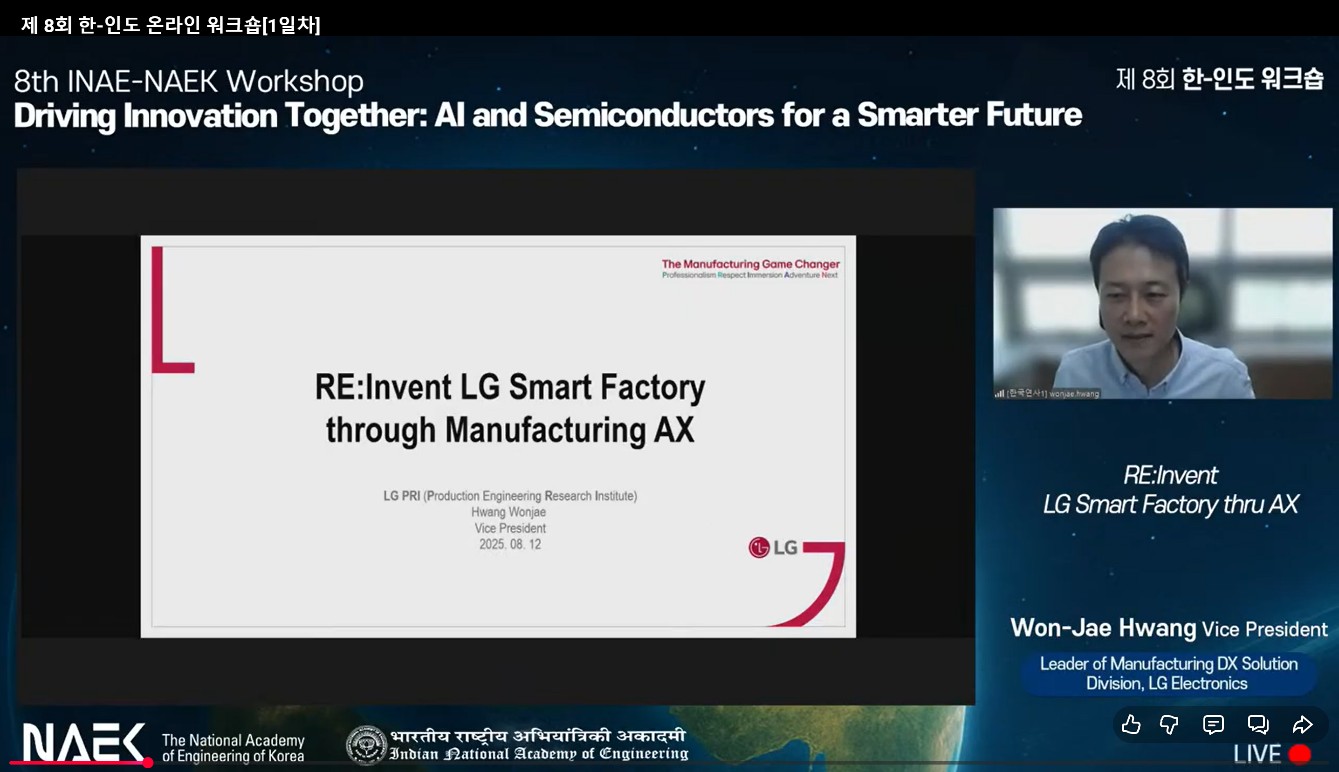 Prof Won-Jae Hwang delivering technical talk.
Prof Won-Jae Hwang delivering technical talk.
Prof. Janakarajan Ramkumar of IIT Kanpur elaborated on AI-driven smart manufacturing logistics. Through detailed case studies on the use of automated guided vehicles (AGVs) in warehouses, he illustrated how AI models optimized scheduling, reduced idle time, and improved throughput by nearly three times. His presentation reinforced the transformative role of AI in intralogistics and energy-aware automation.
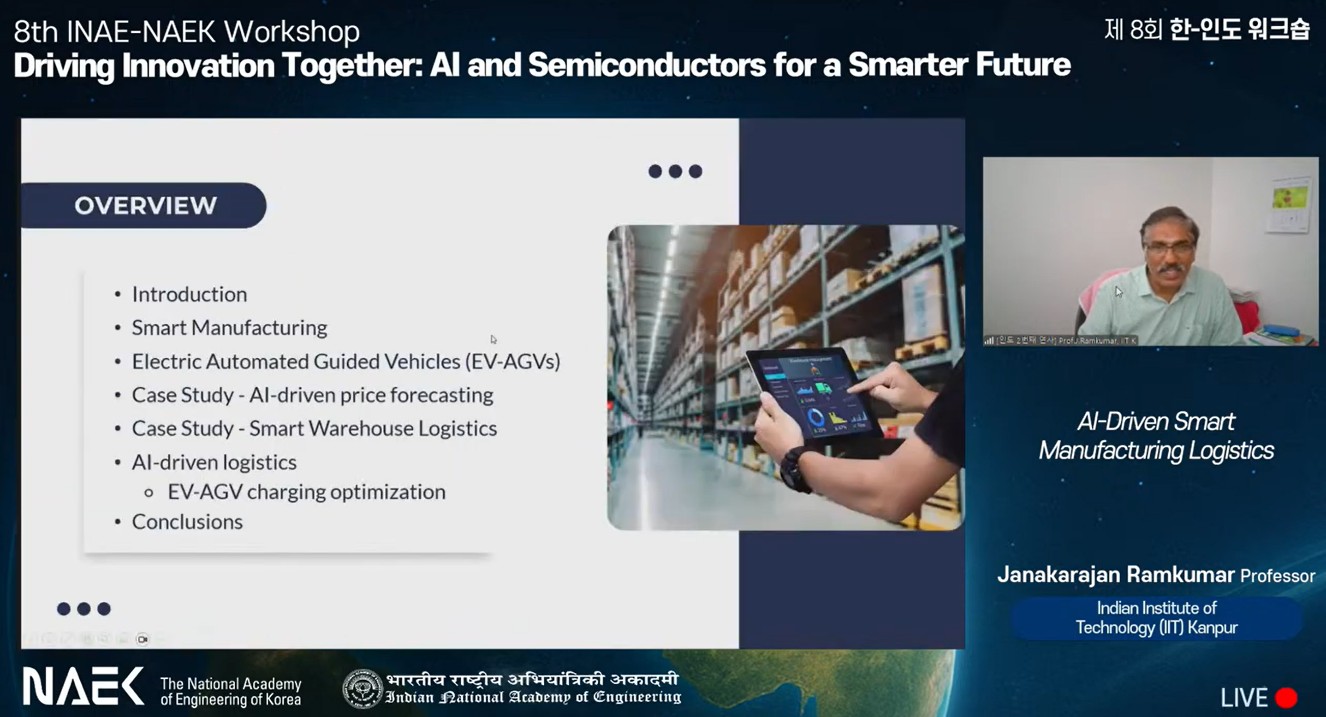 Prof J Ramkumar delivering online talk
Prof J Ramkumar delivering online talk
Session 2: International Cooperation Opportunities in the AI Sector
Prof. Jaesik Choi of KAIST discussed Korea’s experience in AI-driven manufacturing transformation. He highlighted how predictive analytics and hybrid AI models are being used to enhance industrial processes. His insights reflected Korea’s strong ecosystem that combines academic research with industrial application.
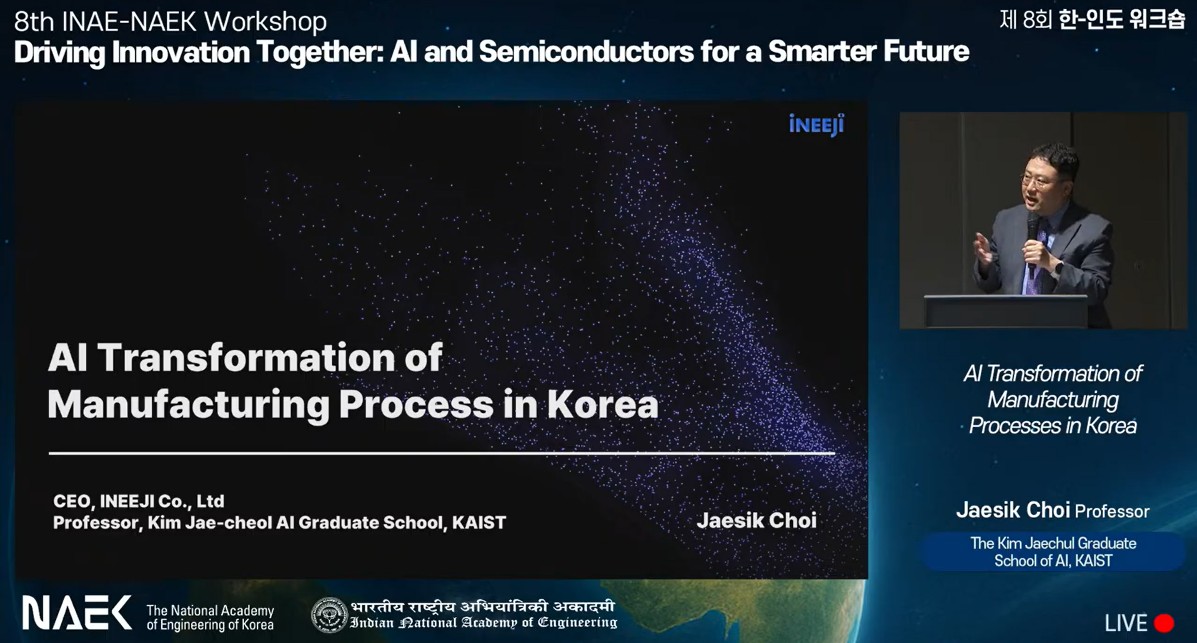 Prof Jaesik Choi delivering lecture
Prof Jaesik Choi delivering lecture
Mr. M. S. Unnikrishnan, CEO of the IITB–Monash Research Academy, spoke about new horizons in Indo-Korean cooperation in AI and semiconductors. Drawing from his industry and academic leadership, he underlined the importance of creating structured research partnerships and bilateral innovation frameworks.
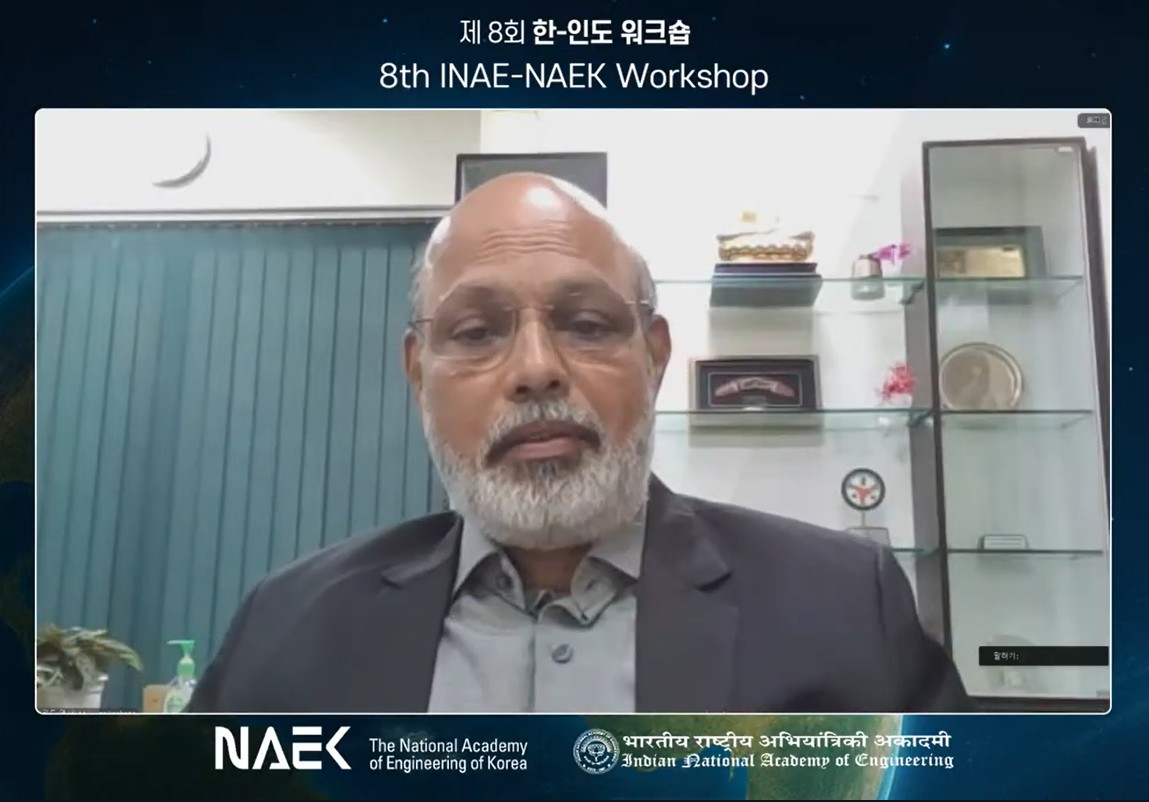 Mr MS Unnikrishnan sharing his view
Mr MS Unnikrishnan sharing his view
Round Table Discussion-1: AI for Smart Manufacturing and Korea–India Cooperation
The roundtable brought together Dr. Kyungwon Joo (KISTEP), Prof. Jeonghoon Mo (Yonsei), Prof. Santanu Chaudhury (IIT Delhi), and Prof. P. Rajalakshmi (IIT Hyderabad). The discussion emphasized how India and Korea can leverage their complementary strengths to build joint AI testbeds, collaborative research programs, and policy frameworks. Experts highlighted opportunities in autonomous navigation, intralogistics, and smart manufacturing ecosystems, underscoring the need for applied collaboration rooted in bilateral cooperation.

Day 2 – Technical Session on “Semiconductor Manufacturing and Fabrication Collaboration Initiatives”
Session 1: Semiconductor Manufacturing Initiatives
Dr. Taejoong Song, Vice President of Samsung Foundry, presented Samsung’s vision for the future of semiconductors and shared success stories from India, particularly the contributions of Samsung Semiconductor India Research (SSIR). His talk underscored the critical role of AI demand in shaping semiconductor growth and highlighted India as a valuable partner in chip design and innovation.
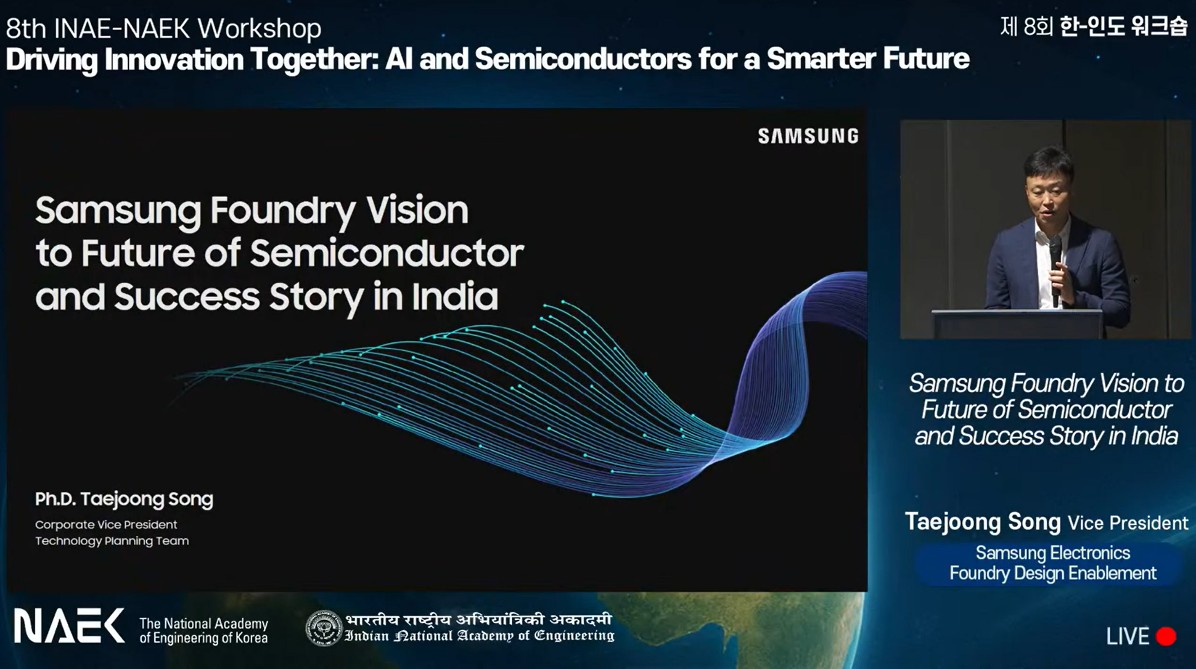
Dr Taejoong Song delivering presentation
Prof. Shiv Govind Singh of IIT Hyderabad introduced pioneering work on low-temperature, low-pressure Cu–Cu bonding technology for 3D IC integration. His breakthrough research demonstrated practical solutions to longstanding challenges in 3D integration, paving the way for advanced packaging and novel device applications.
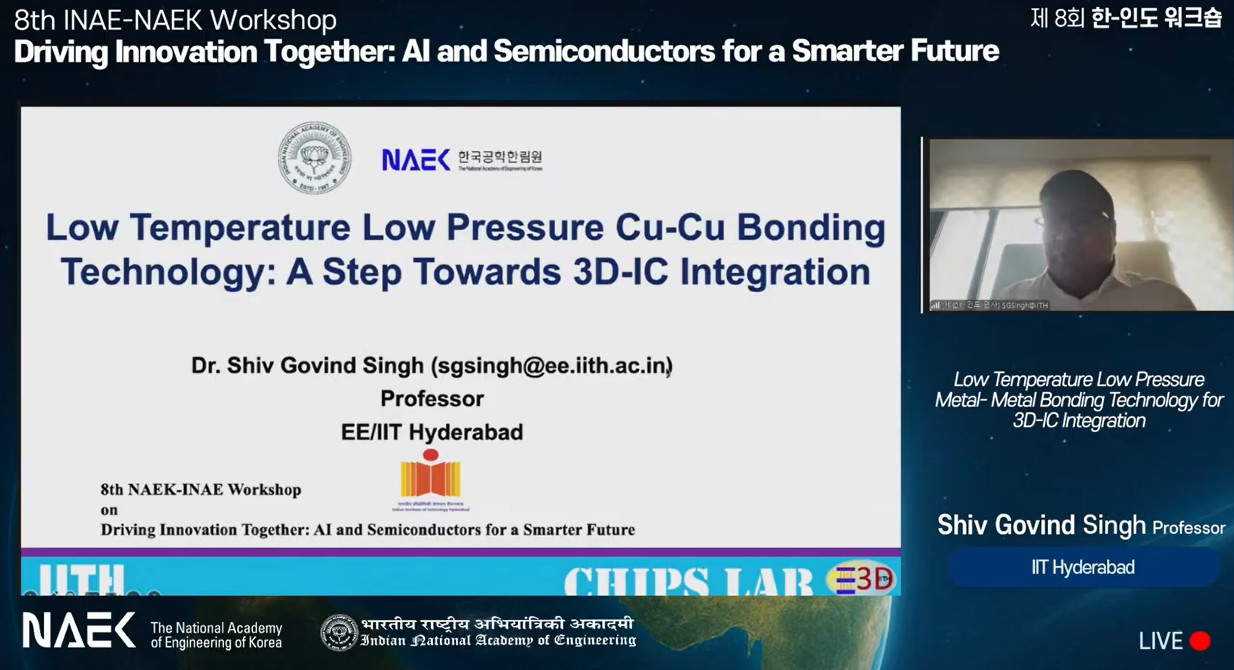 Prof Shiv Govind Singh making presentation online
Prof Shiv Govind Singh making presentation online
Session 2: Fabrication Collaboration Opportunities
Mr. Brandon Myung-Hyun Cho, CEO of SEMIFIVE, proposed a platform-driven approach to semiconductor design that connects India’s engineering talent with Korea’s manufacturing ecosystem. He argued for the urgent need to establish independent semiconductor infrastructure and sovereignty, positioning India–Korea collaboration as a cornerstone for resilient AI hardware development.
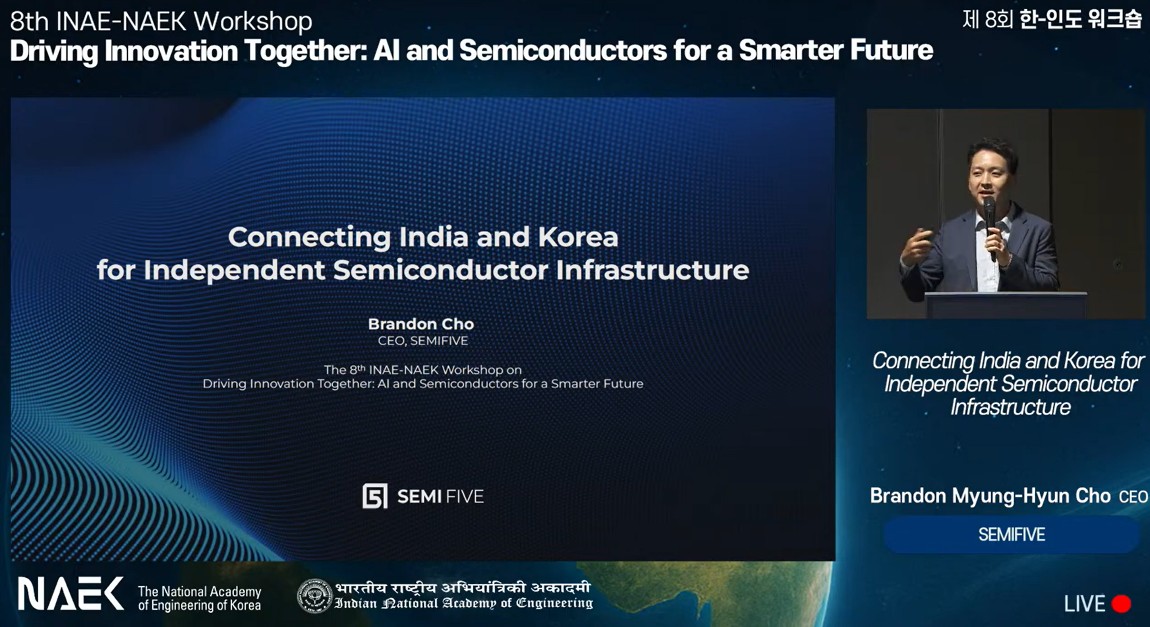
Prof. Souvik Mahapatra of IIT Bombay discussed a comprehensive TCAD-to-SPICE framework for analysing device aging effects like BTI and HCD in CMOS circuits. His talk emphasized the importance of reliability modelling for long-term performance in advanced semiconductor devices, especially under AI-driven workloads.
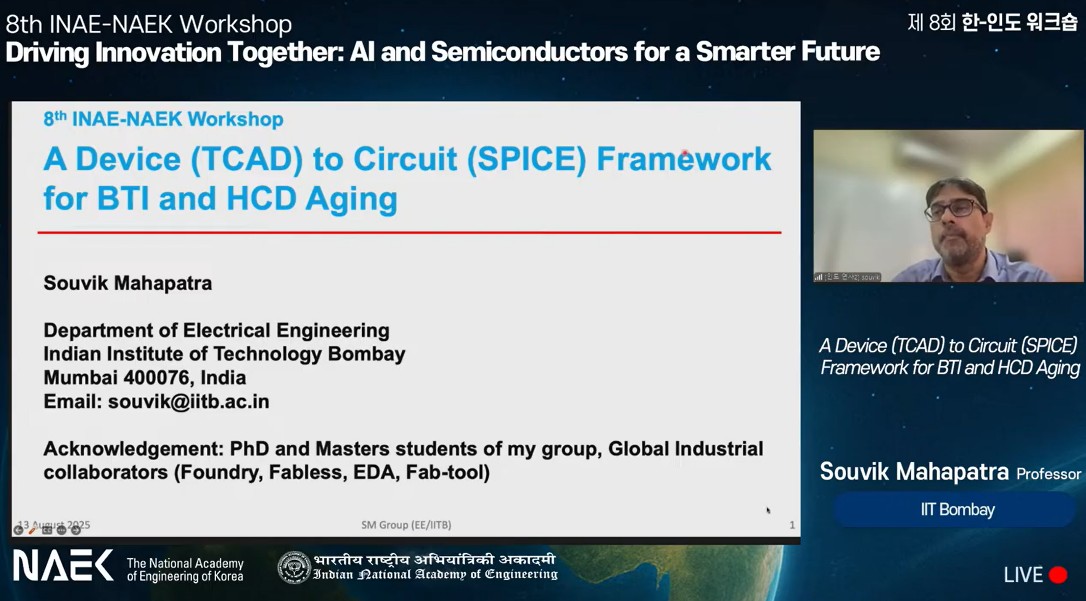
Round Table Discussion -2: Semiconductor Manufacturing and Collaboration Opportunities
The panel included Prof. Rino Choi (Inha University), Prof. Kang-Yoon Lee (SKKU / SKAI Chips), Prof. Swaroop Ganguly (IIT Bombay), and Prof. Shanthi Pavan (IIT Madras). Discussions revolved around building shared fabrication and prototyping facilities, establishing bilateral research consortia in 3D IC and device reliability, and creating skill development pipelines for semiconductor engineers. The experts agreed on the urgency of industry–academia–government partnerships to secure supply chains and accelerate innovation.
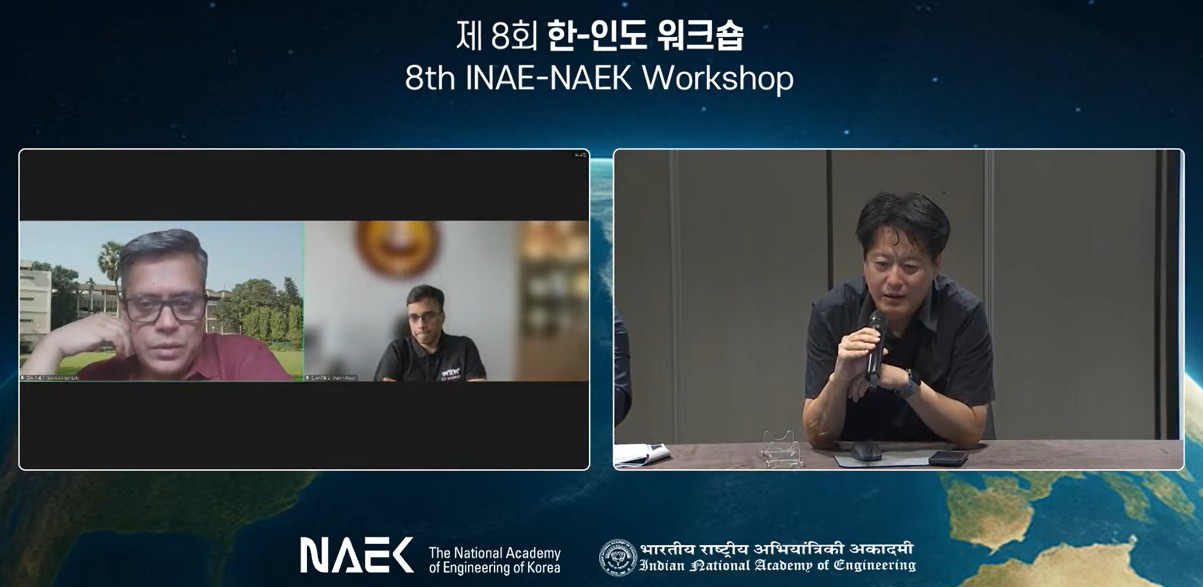
Conclusions
Across both days, it was evident that AI and semiconductors form a reinforcing cycle of innovation — with AI fueling chip demand and advanced chips enabling scalable AI deployment. India and Korea, with their complementary strengths, are well-positioned to jointly lead in these domains. The workshop concluded with calls for joint research consortia, pilot fabrication testbeds, bilateral talent exchange, and policy support frameworks. Establishing permanent India–Korea innovation hubs was recognized as a key future direction to ensure sustained leadership in AI and semiconductor technologies.
Election of Fellows and Foreign Fellows
Nominations for Fellowship and Foreign Fellowship were invited in January 2025 with last date of March 31, 2025 which was extended to April 15, 2025 after due approval. A total of 417 valid nominations for Fellowship (181 New and 236 carried forward from 2023 and 2024) and 27 valid nominations for Foreign Fellowship (16 New and 11 carried forward) were considered by the Sectional Committees during their meetings from May 15, 2025 to May 30, 2025 to shortlist nominees for “Peer Review” and identify suitable domain experts to carry out the review. During the first meetings of the Sectional Committees, 124 nominations were shortlisted for Fellowship 2025 and 15 nominations were shortlisted for Foreign Fellowship in respect of whom, Peer Review were sought accordingly. The second meeting of the Sectional Committees were held from July 21, 2025 to August 5, 2025 to consider the peer review reports in respect of shortlisted nominees and recommend further to the Council in respect of Fellowship and Selection Committee for Foreign Fellows followed by Council during its next meeting on August 22, 2025 in New Delhi in physical mode. The list of nominees selected for election as INAE Fellows/Foreign Fellows for the year 2025 have been uploaded on INAE website and can be viewed at the link given below:
https://www.inae.in/nomination-information/
INAE Young Associate 2025
Nominations were invited for INAE Young Associate 2025 with last date of March 31, 2025 which was extended to April 15, 2025 after due approval. This year, enormous number of valid nominations viz. 223, almost double the number received last year, have been received for INAE Young Associate 2025 and accordingly a methodology was adopted for initial screening of the nominations by the Sectional Committees online based on chosen parameters, followed by shortlisting in the second meeting of the Sectional Committees for presentation and final recommendation before a separate Selection Committee during meetings held in August 2025. The list of selected INAE Young Associates 2025 have been uploaded on INAE Website and can be viewed at the link given below.
https://www.inae.in/young-criteria/
INAE Publications
Transactions of Indian National Academy of Engineering – An International Journal of Engineering and Technology”
INAE is currently publishing a Journal named “Transactions of Indian National Academy of Engineering – International Journal of Engineering and Technology” published by M/s Springer which was earlier named INAE Letters. Transactions of INAE – Volume 10, Issue 3, September 2025 was published through Springer Publishers during the period July 2025 to October 10, 2025.
INAE’s Progress on Donations & Membership Schemes
In accordance with the directive from the Department of Science and Technology (DST) dated 6th May 2022, the Indian National Academy of Engineering (INAE) has moved towards full financial and functional autonomy, with government Grant-in-Aid concluding on 1st April 2025. To ensure long-term sustainability, INAE has implemented a strategic plan—endorsed by its Fellowship and approved by DST—centred around the creation of a dedicated Corpus Fund, supported by six key revenue streams:
- Corporate and institutional memberships,
- Individual donations/membership,
- CSR contributions,
- Government/project support, and
- Publications
INAE Membership was introduced to embrace a wider reach and participation of engineering community, which shall be accorded to working professionals in engineering in the industry, R&D or academic institutions, engineering services, entrepreneurship firms, and government/private agencies. After a duly approved process, Individual Membership will be awarded to aspiring mid-career to senior engineering professionals, to give them a fillip for their future professional journeys who still have milestones to achieve in their career path, before they attain the gold standards to be elected as Fellows of INAE. Individual Membership entails a yearly fee and is as per timelines. The Fellowship retains the premier Gold Standard and the Membership category is independent and by no means affects the prestige of the Fellowship category. An appeal has been made to all Fellows to support these initiatives and help facilitate a greater number of Memberships in all three categories – Institutional, Corporate and Individual Memberships. INAE Fellows have been requested to help facilitate forwarding of nominations for Memberships in all three categories – Institutional, Corporate and Individual Memberships.
INAE gratefully acknowledges generous contributions and commitments from leading corporates and institutions, including L&T, Tata Sons, Google, Infosys Foundation, Microsoft, and others, as well as memberships from premier academic and research organizations. These contributions affirm strong confidence in INAE’s mission and significantly support its journey toward financial self-reliance. INAE has 32 Institutional Members (25 Diamond, 1 Sapphire, 1 Ruby, 5 Coral), and 207 Individual Members (146 Senior and 61 Associate). Tata Steel has taken our annual Corporate Membership while HAL has become Patron Corporate Member.
.
Donations to INAE Corpus Fund
INAE had faced an unexpected development because of the decision of the Government conveyed through the Department of Science and Technology that the funding of INAE would cease from April 1, 2025 onwards. Therefore, a lot of measures had to be taken to counter the situation and the Governing Council took the decision that INAE should raise its own corpus so as to become not only functionally but financially autonomous. A target to achieve about Rs 100 Crores was set so that the annual interest of Rs 5-6 Crores could meet the operational cost of the Academy. Since then, good progress has been made and substantial commitment and contributions have been received, which shall ensure the continuance of the Academy and that INAE would not only survive but thrive.
INAE leadership had appealed to the Fellowship for contributions to the INAE Corpus Fund, emphasizing the importance of collective support during the transition to financial autonomy. Contributions are seen as a shared responsibility of the entire Fellowship.
In recognition of donors, INAE has a Wall of Donors on its website at the link https://www.inae.in/wall-of-donors/

Tax Benefits:
Donations qualify for 50% tax deduction under Section 80G (for those under the old tax regime), with receipts and certificates issued within a quarter.
INAE expresses deep gratitude to all supporters and continues to welcome contributions from Fellows, Young Associates, Awardees, and Corporate partners, which are essential to ensuring INAE’s long-term self-reliance and mission continuity.
Important Meetings held during July 2025 to October 10, 2025
| February 9, 2025 | Fifth meeting on the proposed INAE-Infosys Centre for Engineering Education (IICEE) over WebEx |
|---|---|
| Between 21st July to 5th August 2025 (online) | Second meeting of the Sectional Committees for recommending nominations for Election of Fellows, Foreign Fellows |
| 1st August 2025 | DST-INAE Consultative Committee Meeting |
| 12th August 2025 | · 54th Apex Committee Meeting
· Selection Committee Meeting for recommending nominees for Election of Fellows under Rule 37(g) · Selection Committee meeting for Foreign Fellows |
| 18th – 20th August 2025 | Meeting of Selection Committee for INAE Young Associates – Presentation by shortlisted nominees |
| 22nd August 2025 (Fri) | 156th Governing Council Meeting with Conveners as special invitees in New Delhi in hybrid mode |
International/National Conferences/Seminars being organized by IITs/other Institutions
To view a list of International/ National Conferences/Seminars being held in the month of December 2025 , click here….
Honours and Awards (covering the period July 2025 to October 10, 2025)
| 1 | Prof. (Dr.) Ganapati D. Yadav, FNAE, Former Vice-Chancellor of the Institute of Chemical Technology (ICT), Mumbai; Bhatnagar Fellow; National Science Chair; Padma Shri awardee, and Chairman of BOG, LITU, Nagpur has been appointed as the Chairman of the Governing Body of the S. N. Bose National Centre for Basic Sciences, Kolkata, a premier institution dedicated to advancing fundamental research.
In addition, ICC has bestowed the K V Mariwala award on Prof GD Yadav for effective chemical industry academia partnership to Godavari Biorefineries and the Institute of Chemical Technology Mumbai. The award was bestowed on 19th September 2025 in Mumbai. Further, NITI Aayog has appointed Prof. Yadav as the Chairman of its Working Group, where his leadership is expected to provide strategic vision in steering India towards a bio-based, circular, and sustainable economy. |
| 2 | Prof. Dr. Ulrich L. Rohde, FNAE, Visiting Scientist at MIT’s Research Laboratory of Electronics and Chairman, Former Managing Director of the Military Division, RCA Corp., Camden, New Jersey, USA received the Bavarian Order of Merit for his contributions in the field of electronics and information technology. |
News of Fellows (covering the period July 2025 to October 10, 2025)
| 1 | Prof. DN Singh, FNAE, D.L. Shah Chair Professor for Innovation, Department of Civil Engineering, IIT Bombay, forwarding an invitation to the Fellowship for attending the webinar under the Desai Memorial Webinar Series held on 28th September 2025 organized by International Association for Computer Methods and Advances in Geomechanics (IACMAG). Prof. DN Singh delivered the said memorial lecture on the topic “When Equations Met Experiments”. |
Obituaries
Dr MJ Zarabi
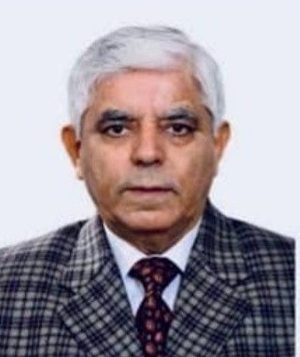
(August 24, 1947 – August 9, 2025)
Dr MJ Zarabi, FNAE born on August 24, 1947 passed away on August 9, 2025. He was elected to INAE Fellowship in the year 1999 and affiliated to Engineering Section VI (Electronics and Communication Engineering).
Dr MJ Zarabi, Formerly Chairman-cum-Managing Director, Semiconductor Complex Ltd., Punjab and Formerly Executive Director Technology, Samtel Color Limited, Ghaziabad had made significant contributions in the areas of Microelectronics and Physical Electronics. He was one of the pioneers who helped laying the foundation of the country’s integrated chip manufacturing effort. At Semiconductor Complex Ltd, he spearheaded the creation of a state-of-the-art VLSI fabrication facility in 1997 and oversaw the establishment of the Gallium Arsenide Enabling Technology Centre for the Defence Research and Development Organisation. He also led pioneering work in Micro-Electro-Mechanical Systems (MEMS). As a technology consultant post retirement, he advised leading companies including Infineon Technologies and Solar Semiconductors. He co-founded Multisphere Power Solutions Pvt. Ltd. and Masamb Electronics Pvt. Ltd., and served on the boards of several major public sector undertakings and private firms. Dr MJ Zarabi served as Vice-President of INAE during the period January 1, 2007 to December 31, 2012 and contributed to a number of novel initiatives. He was co-author of the INAE Research Study Report on “Technologies for Healthcare Sector in India” and was Conference Chair of the International Conference on “Towards a Better Innovation Ecosystem” organized by INAE in 2012 in collaboration with National Innovation Council, Govt. of India, International Council of Academies of Engineering and Technological Sciences (CAETS) and Confederation of Indian Industry (CII). More recently he contributed to INAE Delhi Chapter activities.
May God bless her soul to Rest in Peace
Prof Pushpak Bhattacharyya
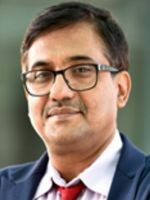
(July 03, 1962- October 5, 2025)
Prof Pushpak Bhattacharyya, FNAE born on July 3, 1962 passed away on October 5, 2025. He was elected to INAE Fellowship in the year 2015 and affiliated to Engineering Section II (Computer Engineering and Information Technology).
Prof Pushpak Bhattacharyya, FNAE Professor, Department of Computer Science & Engineering, Indian Institute of Technology Bombay, Mumbai and Former Director, Indian Institute of Technology Patna had made outstanding research contributions in the fields of Natural Language Processing (NLP) and Machine Learning. Automatic Sarcasm Detection, Multilingual Computation and Indian Language Neural Machine Translation are some of his pioneering research contributions along with Multilingual Lexical Knowledge Bases like IndoWordNet and Projection. He executed several important Government funded and industry projects and received research grants from IBM, Microsoft, Yahoo and the United Nations, among others. He published more than 350 research papers covering major areas of NLP in peer reviewed journals and conferences proceedings and guided more than 300 students for their PhD and Master’s research and undergraduate projects. Prof Bhattacharyya received several prestigious awards and honours including the INAE- ANRF (erstwhile SERB), DST Abdul Kalam Technology Innovation National Fellowship; Patwardhan Award of IIT Bombay for Technology Development; Eminent Engineer Award of Institution of Engineers (India) and Distinguished Alumnus Award of IIT Kharagpur. He served as served as the president of the Association for Computational Linguistics (ACL) from 2016 -17.
May God bless his soul to Rest in Peace











